#look i’m not the best at literary analysis
Explore tagged Tumblr posts
Text
01 ✦ ‘cops and robbers’ chase each other full of energy ! ༄.°
𝒽wang hyunjin x f!reader
masterlist . . . ✰
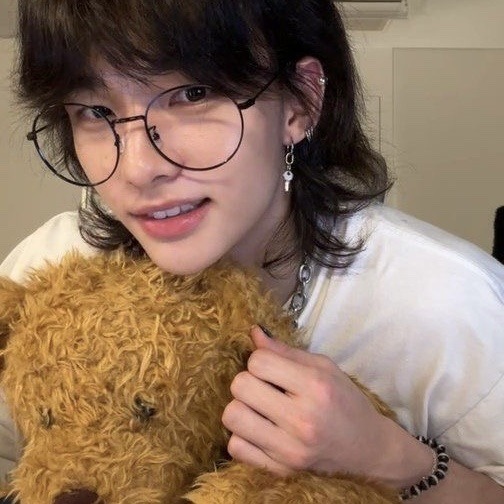
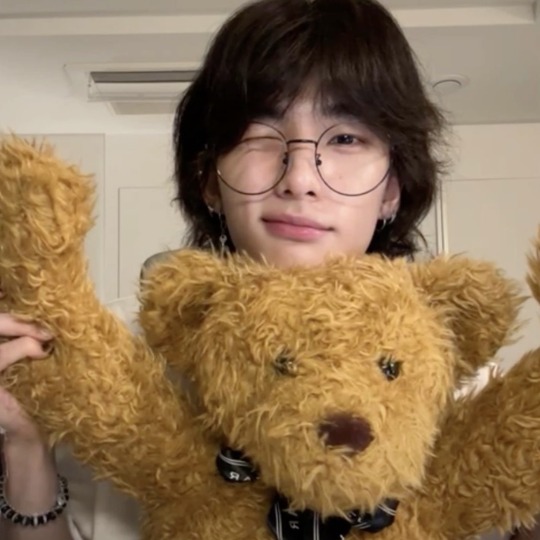
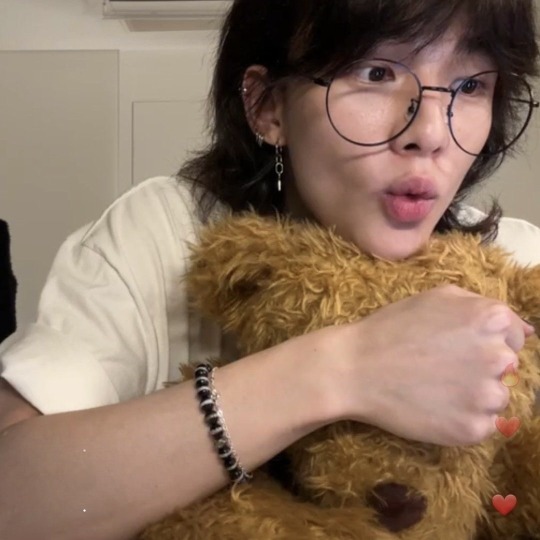

𓆩♡𓆪 𝒶n : i’m going crazyyyyy. I needed to put down—into words—an irl situation, and decided to call it a fanfic for my bias and post it 😭 anywayy it’s my first non-pjo or non-anime fic so I hope it turned out okay 😩 also here’s some fanart I found of the same vlive as the icons above (it’s so cute) ! <3 and as always!! anything I write about the idols is not a representation of them irl ! also possibly part ii coming as soon as I have the patience to write it bc I love the current flow 😋
𓆩♡𓆪 𝓌arnings + tags : day 1 , best friend!hyunjin , non-idol au , high school au , f!reader , best friends who do more-than-best-friends things , hinted bio students attending prep school together: hyune and reader , skz ot8 are in a highschool band together w reader , fluff , hyunjin’s a cutie patootie , smart!hyune x smart!reader , cutesy hand holding , hinting at stress (reader) , reader has glasses (which is unrelated to everything but still) , banter , teasing , ot8 appear a lot , nicknames (n/n, jagiya) , mother chan , jeongin is a menace , swearing a few times ;
𓆩♡𓆪 𝓌c : 0.8k

DAY #01 . . .
“you’re staring,” hyunjin said, continuing to flex his arm’s muscles.
“nope. i’m revising anatomy before class starts. I was looking at the humerus, articulated through the glenoid cavity to the scapula,” I said, smiling.
“oh, sure.” he rolled his eyes. “since you’re staring so hard, wanna kiss ‘em?”
I made a face at him, and stuck my tongue out. “you wish!”
he laughed.
“I have them too, okay?” I said, trying to one-up him, as always.
“what?”
“muscles—”
“want me to kiss them?”
I shoved his shoulder away. “we’re late, walk faster!”
“you’re the one with tiny legs, i’m being considerate— OW! don’t stamp on my shoes!”
“shut up!”
“I won’t!”
we made faces at each other and parted ways in front of my classroom since his was the one next to mine.
I spent the next five hours surviving lectures on enzyme activity, literary analysis of dostoyevsky’s works, thermodynamics, and more boring stuff, alongside minho, felix, and jeongin (who fell asleep around five minutes into the first class).
during the break, our group—chris, minho, felix, jeongin, seungmin, han, changbin, hyunjin and I—met up outside our classrooms.
“here’s your blueberry milk, n/n and felix, my favourite children,” chris said, handing us two cans he bought from the vending machine. we smirked at the others, popped the tin open and started downing our drinks in unison. “and here’s your strawberry milk, min. jeongin, your banana milk.”
the others were in the same class as chris, so they got their drinks on their way out. after collecting our drinks from our rightful mother, we headed up to the roof.
“are there any new songs you guys are working on?” hyunjin asked chris, han and changbin—the songwriters of our band—while falling into step beside me.
our hands brushed once, so he held it anyway, and we continued walking together hand-in-hand.
han was talking about a new song they were composing for the band to play at the next music festival, which required a duet.
“we can do it,” I said, raising my free hand, meaning hyunjin and I. everyone else nodded in approval, and continued talking about their classes.
changbin pushed open the door to the roof, and we quickly followed him in pairs, shutting the door behind us.
we took our spots on the fluffy blanket minho got and laid down, hyunjin’s head resting on my lap. minho sat down with his legs on han’s, while jeongin did the same with chris, and seungmin copied them to lay his legs on changbin’s lap.
we continued chatting about the upcoming music festival and tried to figure out a name for our band before then, while my fingers threaded through hyunjin’s soft hair.
after the bell rang, signalling the end of lunch break (during which none of us actually ate our lunches), we returned to our classes for one last hour, after which, we met up outside the school’s main gate to walk home together.
I ran towards hyunjin while his back was facing me, and placed my cold palm against the back of his neck. he jumped suddenly, and shrieked. he threw his jacket onto my face.
“bitch!” I yelled, grabbing the jacket.
“put it on, jagiya, because your hands are cold as fuck! or you’ll die of the cold and then i’ll have to explain to your mother why i’m carrying her only child’s dead body home.”
“joke’s on you, I don’t think she’d mind. ha! and anyway, i’m a normal temperatured human being, for your information, you’re the warm one!” I complained, slipping his jacket on.
“okay, n/n, we all know you’re wrong on that one,” jeongin said. “give up the fight before it gets too embarrassing—”
“you’re all so mean to me, the best member of our group, and for what?” I rolled my eyes, sighing.
felix and chris stepped in front of me dramatically, and said together, “we’ll protect you from these ghouls, y/n!”
everyone burst out laughing, including them and me.
along the walk home, minho, han, changbin, and seungmin went a different way from the rest of us.
we waved our goodbyes, reminding each other to think of a name for our band.
“when’s our next test, hyune?” I asked suddenly.
“at prep school? I think it’s this friday,” he said.
“ugh, you both are such smartypants, you’re always studying or talking about it,” jeongin complained, accurately playing his role as the youngest child and menace of the group.
“and yet it’s not enough,” I muttered to myself, not realising hyunjin heard my words.
my mind divided its attention between worrying about the syllabus I was yet to cover for the test, and listening to the boys’ conversation.
I was snapped out of my thoughts when jeongin, chris and felix parted ways with us.
hyunjin and I walked a bit further to my house, where he dropped me off.
“see you at prep school!” he said, and jogged a block further to reach his house.

prev < m.list > next

kozumesphone © 2024 | don’t repost my works onto other platforms, or edit and post them even on tumblr, without asking me first • don’t steal my works, steal my heart instead • reblogs and comments are more than appreciated !

#⭑𓂃 skye’s stayverse !#skye's cafe ~ ⋆.˚#skz#skz fluff#skz x reader#skz x you#stray kids#stray kids fluff#stray kids x reader#hwang hyunjin#hyunjin#h. h#hwang hyunjin x reader#hwang hyunjin x you#hyunjin x reader#hyunjin x you#hyunjin fluff#stray kids hyunjin#kpop#non idol au#high school au#best friends to lovers#stay#stray kids everywhere all around the world#you make stray kids stay
154 notes
·
View notes
Text






[ID: 6 panels of a digitally drawn comic showing Daggoo doing twist-outs into Pip’s hair. Pip looks a little nervous through the process, with a warm & encouraging Daggoo, and by the end of it he looks at his reflection with surprised joy. More detailed IDs for each panel in alt.]
i finally finished what i was working on for @creatingblackcharacters’ Black History Month Challenge!
so for those who don’t know, for a few years now i’ve been working on adapting Moby Dick into a webcomic. as you might imagine, a text written by a white man in 1851 is oftentimes Very Racist with how it treats its characters of color, and this very much includes its Black characters, of which there are two of note in the cast, Daggoo and Pip. there are parts of the original text in which Melville tries (and even sometimes doesn’t completely fail) to say poignant things or critiques about racism in the text (and much of the text does very explicitly and intentionally deal w/ racism and racialized dynamics, something literally 99% of adaptations ignore), but for the most part, his nonwhite characters are flat, stereotypical, often violent, racist caricatures.
and i won’t get too much into that here (god knows i’ve rambled at LENGTH abt all of this many times & i will many more), because the point of this challenge is to share art about Black joy, but suffice to say that! I am doing my best to intentionally engage with the race & racism of the original text, whether it’s for characters of my own racial identity that Melville bastardizes (like Fedallah), or those of others (like his Black characters, Daggoo and Pip, and his Indigenous characters, and so on). It’s important to me not only to be in conversation with and to challenge Melville’s racism in my work, but also to allow these characters to be more than the one note racist stereotypes Melville writes them as.
So!!! that’s some long winded context, but here’s Daggoo doing Pip’s hair for him and showing him how! I’m extremely fond of Pip getting to be loved and cared for by others of the crew, especially the harpooners (of whom Dag is one). i just think Pip deserves his comically large number of dads who will care for him and make him feel safe and shelter him from the absolute Horror that is 19th century American Whaling (and the Horror that is their white crewmates!). i just think this little Black boy deserves love and joy 😭😭 and i think Daggoo deserves to be a soft, gentle caregiver who can give that to him.
I have lots more thoughts about this and about them and about their hair which i may expand on under a cut or in the tags, but because this is already getting so long!:
to my Black viewers, and my Black readers, you belong in classic literature spaces! you deserve to see yourselves represented thoughtfully and carefully in the ‘canon’ of literature, and to challenge when you aren’t, and be supported in your critiques! your contributions to both literature as a whole (whether “classic” or otherwise) and to literary analysis and critique are invaluable and irreplaceable, both when you discuss the racism in these works and spaces and when you engage in any other kind of analysis or creation. And I want you to be able to enjoy stories of all kinds without people brushing aside your existence or pretending your concerns are invalid or don’t matter because ~it’s a great classic!~ or ~it was a different time.~ your voices and your creations and your art matter.
& on the smallest scale, i hope at least to bring you a little bit of joy.
I'm tagging some of my art friends! I know the lateness of this in the month means it’ll be hard for anyone to probably do anything of their own for the challenge, but hopefully y’all can still check out & support all the lovely art that’s already been made for this!! @coulson-is-an-avenger @fricklefracklefloof @layalu @brainwormterrarium @seaflying-fliptuna @rootscorrode @holocephal1 and anyone else who wants to!!
& thank you to Ice for making this wonderful challenge, and thank you for all the lovely, incredible work you do on @creatingblackcharacters. truly a blessing to this world 💖💖
anyway, some more notes, because i can’t help rambling:
i referenced a lot of images & videos of people doing twist outs for this but i wanna shout out the video i watched and rewatched and paused and zoomed in on the Most; it’s by kbmaria on YouTube and called “Twist Out on Short TWA 4C Hair | Big Chop Hairstyles”!! def go check her out :]
i loved looking up 1800s hair combs (and afro picks, though it seems they were all just called ‘combs’) & 1800s sleep bonnets for this! the details of the bonnets kind of got lost in simplification (they really do just look like modern ones but with more lace!) but drawing them and the comb was still fun. i also was looking up specifically a lot of Black hair care history and there is some really cool stuff about the original invention and spread of the hot comb (used for straightening hair) and Black people’s role in that (there’s again more i could get into but i won’t right now but do look it up if you’re interested! the library of congress has a good presentation article with sources about Black hair care history. much of it is later the timeline that’s relevant to these characters in particular, but still very interesting!)
i always defaulted to giving Daggoo an Afro when i designed him (mainly because he’s described with one in the book). over recent years, i’ve definitely thought more about this decision and about whether/how to incorporate different hairstyles into representing him. whaling is a…unique situation—long, long stretches of time (we’re talking months) of extreme lethargy with no tasks to do punctuated by unpredictable short bursts (days to weeks at a time) of incredibly high intensity, life threatening, and laborious work. it leaves lots of time to do more complicated, time-intensive hairstyles (which his hair definitely could benefit from in an environment where he’s getting very sweaty, sea-salty, and wet frequently!), but any of that time could be interrupted at any moment; it’s impossible to Plan for when the whale hunts happen and put your hair in a more protective style ahead of time. i don’t really have a specific answer to this yet, but it’s smthn i’m thinking about a lot and researching a lot! visual historical references we have (that i’ve seen at least) of Black sailors of this time tend to have their hair natural and short-cropped (which is how Pip keeps his), but i def want to draw more hairstyles on Dag at different points.
in any case, i do love the idea of him doing Pip’s hair for him (even if the style will be Very temporary due to the nature of their work — he’ll probably get wet very soon 😔) and showing him how to do different ones. starting with something maybe a little easier to do (like this twist out) and maybe showing more complex ones as time goes on.
as far as hair moisturizers go, ive also done a good amount of reading over the years of what kinds of hair moisturizers were available at diff time periods (did you know lots of victorian women used egg washes in their hair to keep it moisturized? i didn’t). i like to think that Dag keeps his own personal stash of natural oil of some kind — he may have access to coconut oil/cedarwood oil/smthn like that. and if he’s ever in a pinch, apparently whale oil is a fine hair moisturizer! and was even used in cosmetics in the 20th century! so hey. got plenty of that around lmao
i think that’s all i have to say for now lmao. thank you again Ice for making this challenge 💖💖
#cbc bhm challenge#black history month#daggoo#pip#mobydick#moby dick#herman melville#melville#art#my art#quasartalks#anwyay in case the me rambling for 482948293 years wasn’t clear: i care themmmm 😭 theyre so dear to me
111 notes
·
View notes
Text
Like Crazy MV Analysis Part 3: Symbolism and Thoughts
Link to Part 1
Link to Part 2
Thoughts on the MV’s Storyline and Symbolism
The opening sequence being our introduction into the world of this MV gave me my strongest theory about the plot of the MV. My main theory is that the Jimin in Set 2 is the present Jimin, attempting to recall the events of the rest of the MV. This is supported by the quote I’ve included below from the MV shoot sketch. He appears to be wanting to stay dreaming of when times were enjoyable, despite being aware of the underlying rot in hindsight.
Jimin says something interesting in the Like Crazy MV shoot sketch. I haven’t watched the movie Like Crazy, and so can’t comment on the exact scene he’s discussing, but he says that the concept used for the MV is a scene where the characters say something like the dialogue he includes in the opening of the song, which is back-translated in the subtitles of the sketch to, “You don’t have to worry, I won’t leave.” So Jimin himself says that the main storyline of the MV is a crumbling romantic relationship, even if it’s a literary device for a deeper meaning in the song. Again, a disclaimer: I am not saying that this is Jimin’s experience, just the character and storyline he’s acting out. He himself clarified that the MV was a dramatization with a lot of artistic license.
I’ve read the summary of the movie, and basically the couple break up due to an immigration issue, get back together and married, remain separated by the immigration issue, cheat on each other when apart, and then reunite to the open ending of a crumbling relationship. I’m assuming that this scene he’s referencing is either in the portion where the couple are getting married, or at the end of the film as the relationship falls apart. If you’ve seen the movie, please correct me if you’re more aware of what he’s talking about specifically.
The biggest and most obvious piece of symbolism running throughout the music video is the mud. Jimin says in the shoot sketch, “You’ll be able to see my room and my hand turn to mud because of a variety of emotions and memories”. He doesn’t specify what these emotions and memories are, so let’s look at what mud symbolizes.
Depending on the source, mud has a lot of symbolic meanings in literature, poetry, and dream interpretation. Given its placement in the MV, I’m going to focus on the negative meaning of mud and not the positive ones like rebirth, new life, etc. In this MV, mud can be interpreted as corruption, toxicity, stagnation, misery, or chaos. My best guess is that it is intended to be cross between all of these interpretations. The woman who pulls him into drunken escapism is not a good influence (corruption/toxicity), he becomes trapped in a cycle of escapist behavior (stagnation), this behavior gets out of control (chaos), and it ultimately makes him deeply depressed (misery). So the mud is intended to be the most obvious clue that this is not a happy storyline, and that there is an underlying darkness to the whole piece.
The piece of symbolism that I feel we as fans should be discussing more is the use of smartphones and the camera lens itself to represent the intense surveillance Jimin is under. This is the one piece of symbolism that I feel is not a reach to relate directly back to Jimin and not just the character he is playing. Even when Jimin’s character gets drunk and lets his guard down, people are recording and judging him. If he chose to make his character easier to play by also making him famous and surveilled in his private life, as Jimin has been experiencing for over a decade, that was a very pointed creative choice. Perhaps, instead of a visa like in the Like Crazy movie, the character Jimin is playing and that character’s love interest were separated by privacy and surveillance issues, or the difficulty of finding genuine romantic partners when famous.
I do feel that the woman we see briefly in the MV is intended to represent the female protagonist of the Like Crazy movie. The frequent scenes with Jimin wandering the crowd searching for someone, the juxtaposition with the woman in the crowd doing the same during the interlude, and the fade to black as soon as they lay eyes upon each other that felt to me like an implication of a time-lapse gave me the idea that, even if she is representing the escapist tendencies he was going through in the storyline of FACE or his reflection, she’s also a love interest in this MV. So I interpret their encounter as fleeting or unhappy enough to leave him having an existential crisis in the bathroom in the next scene.
The character also seems preoccupied with human connection. If we are not watching the character looking desperately lonely, we are seeing scenes of the kind of human connection that is ubiquitous for young adults in clubs and bars: short-lived friendships, conversations, romantic encounters, dancing together, etc. The whole video alternates between loneliness and needing liquid courage to initiate human interaction, which is something very relatable for anyone on the shyer side or who experiences social anxiety. My interpretation is that the character is not so much afraid of losing the specific relationship with the love interest, but is simply unwilling to be alone in a crowd or at home with his thoughts again.
The final device I’ll touch on here is the use of camera techniques such as blurring out the background actors, the thermal camera, and extreme color-grading to anonymize the crowd in the way memories become blurry after excessive drinking. The way the entire album treats drinking culture is powerful, in my opinion, because despite the prevalence of social drinking, FACE takes a fairly negative tone regarding excessive alcohol consumption. Every time it looks fun, we get scenes of loneliness and depression contrasting that glorification of clubbing culture. Jimin clearly feels using alcohol as a crutch is a bad, unsustainable habit, and he was remarkably frank for a K-idol on how bad of an idea it is to remain on that path.
Jimin was fairly trepidatious about how the acting in this MV would turn out in the shoot sketch, but in my opinion, the combination of his personal acting style and the excellent editing and direction teams he clearly utilized made a beautiful piece of cinematography, that illustrates the central themes of the song perfectly.
Extra Observations
I was aware of Jimin’s tendency to use his head and neck to emphasize certain moves in dance choreographies, but he does the same constantly throughout this video. I initially started a tally for the amount of times his head rolls around, but quickly lost count. It’s so effective from a storytelling perspective, but as someone who also suffers from chronic pain I was wincing in sympathy, because if that many head rolls made it into the MV, how many additional takes of rolling his head were there?
Did he intentionally include a left shoulder liberation in both FACE MVs as a bone to throw to fans?
Did anyone else catch the two books on the table in Set 2? The white one appears to be “Beyond the West:New Global Architecture”, but the only thing I could read on the cover of the grey book is “Atlas”. I think they’re nods to the central conflict in the Like Crazy movie being visas, because I feel that choosing English-language books with coincidentally relevant titles takes a lot more effort than finding Korean books of the right color palette and size.
45 notes
·
View notes
Note
for the ask game. please put him under the microscope

[to all my other sskk+kuro mutuals - love ya, have a little treat from me mmmwah!]
Why, my darling loving literary versed and slightly unhinged friend, you have my eternal gratitude for blessing me with this opportunity to analyse our bastard son. This ask just brought the brightest smile upon my face, because it was so unexpected but also, oh, how my soul has been craving it without my knowledge. I shall make a fair warning here: all of this is going to be my pure and unblemished opinion, since I have read 0, and I mean 0.00 Kuroshitsuji analysis (unlike, yk, for some other cursed by fate morally gray and doomed by the narrative characters for whom I have read every single instance of meta knowledge that can be found on this blasted site). So this shall be fun! Hopefully I can do him justice with my measly understanding of the source material and longtime hyperfixation.
Favourite thing: Ok I feel the need to be very insightful here and analyse the complexity of his character and why he’s such a unique and lovable protagonist besides being an absolute insufferable little shit but, honestly, it’s his character design for me. The way he’s drawn in the manga and espeeecially in the latest volumes where Yana’s art style has grown and flourished so much - it’s magnificent. Such a simple yet striking design, with the glowing engraved with runes purple eye beneath the eyepatch and the very simple boyish blueish hair which oh thanks god he doesn't look like your typical anime protagonist with crazy hair (it also helps to drive the appearance of just a normal little boy who's driven into a world of pure madness and forced to grow up and essentially come on top of the underground “mafia” because of his heritage)
Second, his asthma. As crazy as I may sound. The connection I feel to him because of his lung problems is as limitless as the sky. I adore asthma representation in media, it’s very important for me and I feel that his was portrayed very respectfully and serves to paint the full picture of his story.
Third, all the goddamn chess metaphors to his name. I love the chess symbolism to SHREDS!! And everything related to his personality to stem from that yes.
Least favourite thing: MMmmmmm some of his earlier outfits imao, I can think of some especially atrocious ones from the anime (the colors are NOT helping). But don’t get me wrong - I also love a lot of them. Especially those from the dreamscape, yk what I'm talking about.
Favourite line: I just realised I don't have one???? Preposterous, gotta go on a deep dive gimme a sec…
“I prefer to have my nightmares with open eyes.”
Oh that's a sick one I like it! Coming back to check Ciel quotes I'm being reminded this boy has some terrific life philosophy and I love him for it.
brOTP: Ok it’s a bit weird to call it a “brotop” but in the sense of which platonic interactions I love the most of course I need to say between those of our main duo. Ciel and Sebastian have the most complex and interesting dymanic, possibly out of any characters in media outside of kuro too, I just don't feel confident enough to analyse it here because honestly it's hard even for me to put into words.
OTP: I feel like the story of Black Butler is best told without any romance, so I’m gonna say none.
nOTP: For plot and current manga development reasons, as tragic as it is, I need to say Lizzy/ Ciel (both in fact). I love Lizzy, so so much. She became very dear to my heart the second her backstory and real character was revealed in Book of the Atlantic. Her love for Ciel is tragic in many ways. It makes for a dramatic interesting story but I still feel sympathy for her.
Random headcanon: He would soon reach a point when he'd start wanting to tear himself from Sebastian's care - maybe just to spite him, maybe to prove to himself he's as physically weak as he's perceived, but he will start making his own tea or trying and failing spectacularly to make his own desserts and little things like that.
Unpopular opinion: uuuuh gonna skip this one i can't think of anything perdonami perdonami
Song I associate with them: Easy. So easy in fact that I searched for the song the second I opened this document and it’s been playing nonstop for an hour while I write this. I have so many fond memories of this song because I discovered it very early into my Kuro obsession and at first I didn’t even realise it’s not an “official” character song, it just fits so so well. I remember this song carrying me through my uni prep art courses when I was feeling so stressed and close to throwing up, I always put this on repeat to calm me. I barely even remember what the lyrics mean and yet I still feel a very intense connection to it.
youtube
Favourite picture:

I shall not and need not elaborate further thank you :3
#kuroshitsuji#black butler#answered asks#ciel phantomhive#i love ciel so much you people he is one of my very favourite protagonists ever#i shy from posting about kuro on this blog because i like to keep it as purely ss_kk as possible#but just know that kuro is my OG main obsession and I've loved it for years and I'll love it for many more#thank you dear kat for granting me with this wonderful opportunity to gush about our best boy!
20 notes
·
View notes
Text
Pomefiore Endnote - Perfectionism, Apathy and the True Tragedy of Book 5
Warning: Long post and pic heavy.
So…this is something of a continuation of my last twst reaction post, where I analyzed the Absolutely Beautiful dance video. I ended the post by saying that the true tragedy was not that NRC Tribe lost but that Vil could be convinced he was an inferior performer compared to Neige. Now I’m going to expand on that…in excruciating detail. XD
In all seriousness, though, I'm not really sure if I'd call this an analysis in the traditional sense. Maybe more like a long-winded rant based on canon observations. But all the same, I’ve been grappling with this for the last year and a half since when Book 6 first dropped in EN. I’ve wanted to share my thoughts for a long time but decided against it because I acknowledge how contentious this topic is in the fandom and I prefer to keep my online space as drama-free as possible. I also didn’t want anyone to get the idea I’m attacking others when at most, I’m just being critical.
But with the new story update imminent and it looking like it will be Pomefiore-centric, I’ve come to the realization that if I don’t share this soon, I never will. My timing is admittedly ass but I think it would be worse if I share this AFTER the update and you’re about to understand why.
So before we dive in, disclaimer. This is going to cover the end of Book 5 and the first few chapters of Book 6 and my in-depth opinions on both. There will be mentions of trauma/mental illness and some very blunt (but honest) Rook criticism. But please keep in mind, that while I have my own interpretation of the twst characters and their respective arcs, I am not Yana and ultimately, my opinions are just that. Opinions. Everything I say is subjective at best but a lot of what’s coming up is based on a blend of canon observations as well as my own specific, personal experiences as someone with very similar life experiences as Vil and has been dancing for most of her life.
Still, these are just opinions and I have no intention to offend anyone. But if you don’t like reading negative things about Rook or take issue with this general way of thinking, I HIGHLY advise you to ignore this and respectfully (or quietly) agree that we disagree.
When I wrote the greater bulk of this, it was around when Book 6 dropped in EN. A year has passed since then and I’ve had time to think more about my opinions here and, to a greater extent, how I feel about Book 5. This may sound strange but I feel that Book 5 is both the best and worst part of twst’s main story to date. I really like how it touched upon something that isn’t really isn’t talked about much; how we as a society both admire beauty but also vilify it. Vil’s primary dilemma is how he is wrongfully villainized for his beauty, wealth, and harsh personality, despite subverting expectations of cruelty at every turn. Ironically, when the fandom mischaracterizes him as vain, cruel, classist, racist and the like, they are falling into that same literary trap. Proving the point of his arc.
And as much as I hated the ending from an emotional point of view, I actually love it as well, ironically for reasons that might not have been intentional. What I hated, mostly, was the fandom’s response. There was a great opportunity here for some deep discussion regarding society’s views on beauty, how constant trauma causes us to internalize false perceptions of ourselves, and the rather fascinating/dangerous dynamic Vil has with his vice dorm leader. Instead, any interesting discourse has been lost in all the misinterpretations of Vil. To the point I wonder if we all actually read the same story. I’m disappointed in the fandom, but somehow not surprised either.
But regardless, Rook’s actions were extremely disquieting but not for the reasons you might think. There was nothing wrong with his decision but the way he went about it and how he (and Vil) tried to justify it really left such a nasty taste in my mouth and I gotta talk about it to get it out.
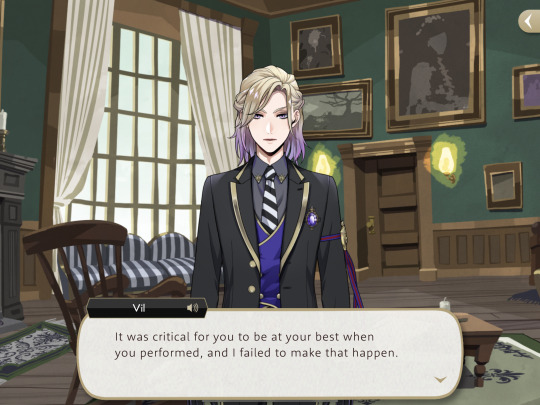
First I just want to commend Vil for his level of maturity and rationality regarding his overblot. Even when it was happening, not once has he tried to justify his actions and in fact it was his own guilt at his potential wrongdoing that ultimately caused it. His fear that in a brief, desperate attempt to be seen as not a monster, he became exactly that. Throughout Book 5, it is implied that Vil already sees himself as a villainous person and internalizes that image of himself almost with pride. But despite this false perception, his actions have always proven the opposite and it’s clear that Vil has always valued being altruistic, determined and just. And his guilt when he failed to meet his own standards was beyond compare.
I feel that this guilt sets Vil apart from the other overblots thus far. Most importantly, he apologized of his own volition and wasn’t forced to. That alone makes him stand out among the overblot characters and, to my mind, makes him the most compelling of them all. If I’m being completely honest, out of all those who have overblotted thus far, Vil has been the LEAST problematic even before his overblot. And the one instance where Vil displayed any “cruelty” beforehand is EXTREMELY subjective. (his treatment of Epel) But the fact that Vil has been the least problematic overblot student so far also makes him the most tragic. And makes what’s about to happen next all the more disturbing.
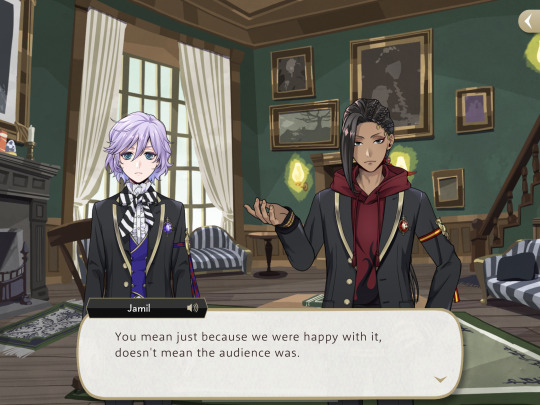
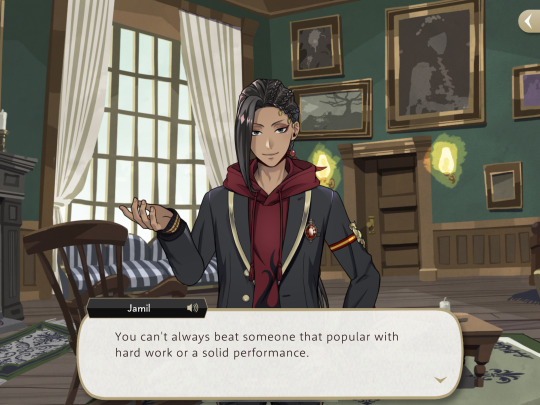
Interestingly enough, Jamil is correct about this but for the wrong reason and here comes the first point. There was no indication that the audience was anything but enthralled with NRC Tribe. And if Vil or any of the others made significant mistakes, because of Vil’s fame, I’m certain they would have been pointed out by magicam netizens. With the recent release of the Absolutely Beautiful mv over on twst jp, we now also have a visual to go off from.
I talk about this more in a previous post but basically, yes, NRC Tribe’s performance wasn’t perfect, but based on what I saw, I would have expected A LOT worse considering the circumstances. The fact is all evidence points to the NRC boys giving a wonderful performance made all the more remarkable by the fact they were still able to perform after dealing with Vil’s OB not too long before. And the audience clearly thought so too if they were only one vote away from victory.
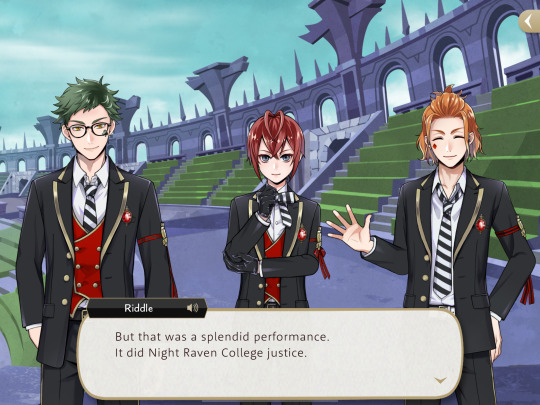
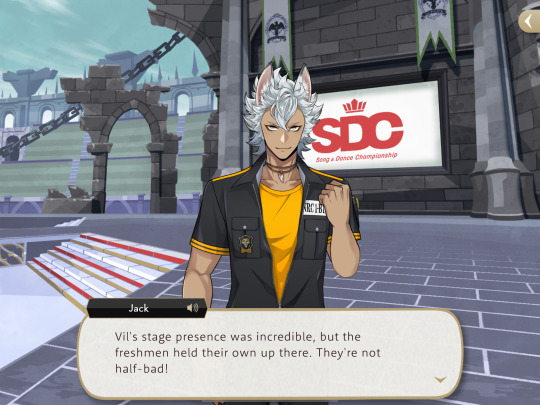
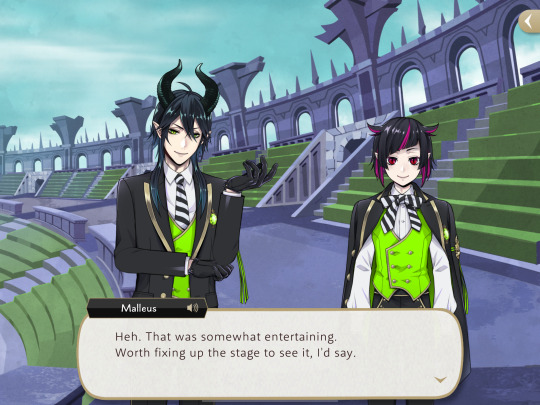
To add to this point, when the other characters comment on the NRC Tribe’s performance, they make no mention of any noticeable errors. And when Crowley laments their defeat later, again, there’s no mention of any errors. Considering that Ambrose was pretty pretentious about RSA winning, I'm sure he’d mention that, too.
Even further, one thing you learn from being on stage is that your audience rarely notices mistakes unless they are extremely obvious. You, as the performer, might notice, but you quickly learn not to draw attention to your errors and keep it moving. Now of course, the NRC characters could be biased because they want to defeat RSA. But considering the nature of a lot of them, I doubt they would lie so flagrantly. Especially Jack who is pretty no-nonsense even with the people he likes. And Malleus who seems pretty difficult to impress. So if their commentaries are to be believed, this shows that any errors made by the NRC Tribe were not noticeable.
That Vil would think otherwise speaks to something far deeper and far more insidious. Stick a pin in that; we’ll come back to it soon enough.
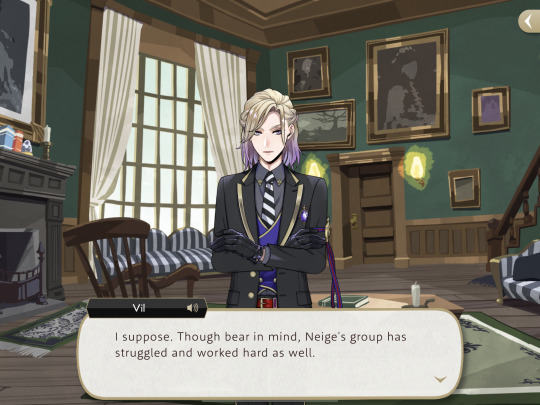
Vil then goes on to explain to the boys that Neige and his friends worked just as hard and had their own struggles. That Neige grew up in an improvised environment and had to juggle acting obligations with household chores and helping out the dwarves. Again, it is extremely commendable that Vil is able to acknowledge this about this rival. It shows that his contempt for Neige was never as simple as “boo hoo people think he’s more beautiful than me” and he at least respects Neige’s efforts even if this explanation once again falls flat.
Firstly, narratively speaking it doesn’t make sense that Vil is just finding out about Neige’s backstory now (likely from Rook) because I feel like he should already be aware. In fact, all through Book 5, I thought that he did know but didn’t care. Honestly, Neige’s backstory shouldn’t matter to Vil anyway and surprisingly, it’s Ace of all people who explains why.
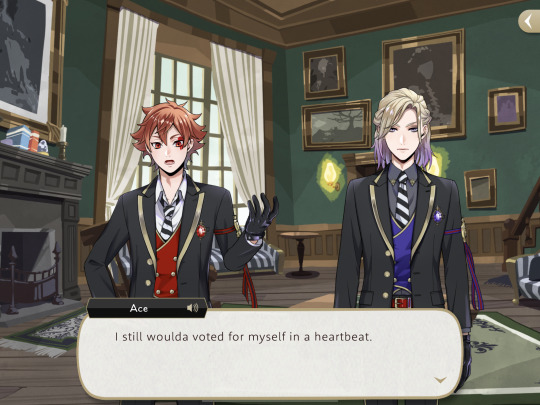
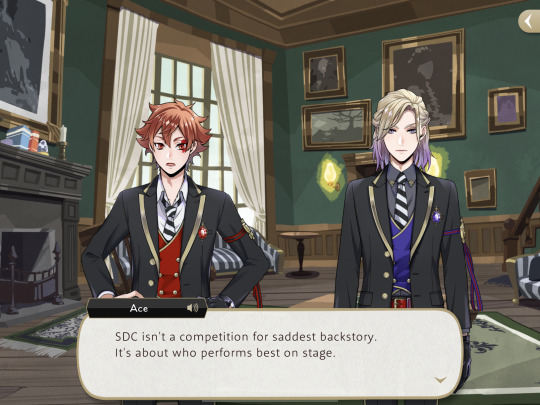
Neige’s struggles might matter to his fans but at the end of the day if Neige cannot perform better than Vil, then that’s his own fault. There are many artists out there who have to deal with similar struggles but come out as phenomenal performers and yet Neige’s “best” basically consists of the twst equivalent of this meme. Precious, but cannot compare to all the sweat and tears Vil and his team were put through.
There’s actually an interesting analysis floating around this hellsite about how Neige’s childish performance was actually an incredibly manipulative tactic and could have been intentional if he were a different character. I’m not gonna link it cause I don’t want to bring any heat to the op. But I will say that while I don’t think Neige intended to manipulate the audience with his cuteness, in the end, it did indeed work in his favor. And the fact that Vil thought to train Epel to weaponize his cuteness to defeat Neige indicates that he’s already no stranger to seeing such underhanded tactics in the industry he works in. In his beansday vignette, Vil mentions an actor he initially admired destroying one of his stage outfits. If Neige weren’t presented as so naive and twisted from a traditionally “good” character, his choice regarding his performance could be regarded as deliberate. Which is why Vil lamented that he and his team had been “outplayed”.
Back on topic, what I took away from this was that, once again, Vil’s hard work and determination count for nothing because of things he cannot control. Because he was born to wealth, because he didn’t have the same hardships, he doesn’t deserve the same consideration or sympathy as Neige. And his wealth and beauty once again put him in the position of villain to Neige’s hero. It’s a textbook case very common in media, like Sharpay opposing Gabriella in High School Musical. But what’s worse is that from all that we’ve seen of Vil, he could coast on his wealth, beauty and father's fame if he wanted to.
Instead, he chooses to work hard and have his accomplishments come from his own merit. When anyone else in his situation could easily choose the opposite. And just from a personal standpoint, if I practiced day and night for a dance competition and ended up losing to someone under my level simply because they were cute and disenfranchised, I would feel extremely insulted. At the end of the day, Ace is correct and whatever struggles Neige and his team had, they were still inferior performers.
And to add to this point, I believe that at some point Vil KNEW this even AFTER his OB. Despite his earlier anguish at never being able to perform innocent cuteness like his rival, once his mind was clearer, he was able to see that NRC Tribe’s performance was still technically better. He was able to see how the audience responded to Neige and still believed in himself as a better performer. I say this based on another scene earlier in book 5.
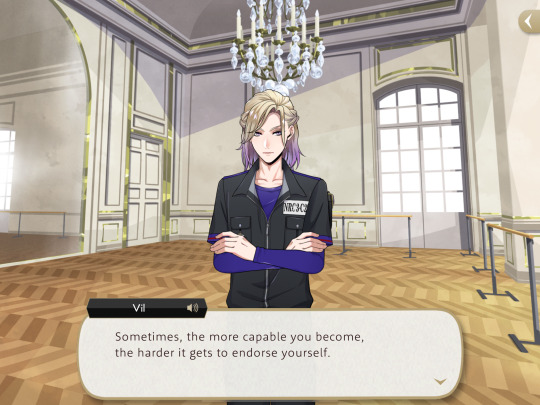
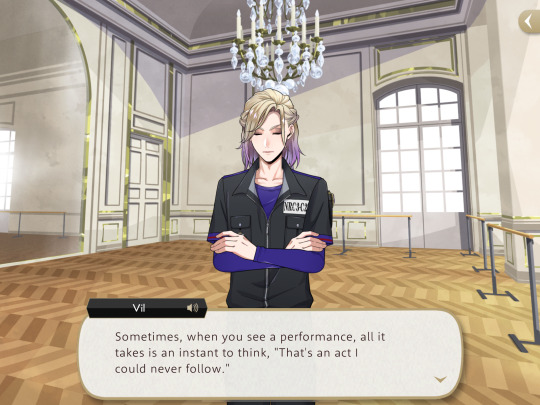
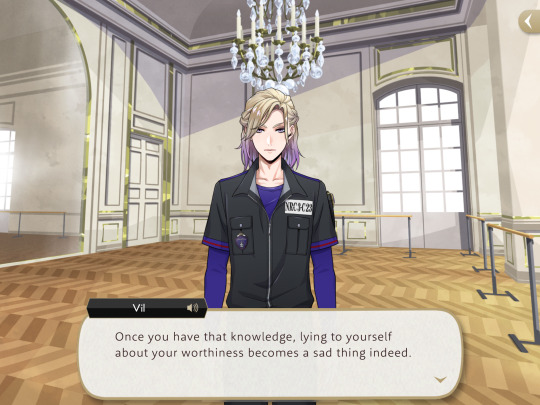
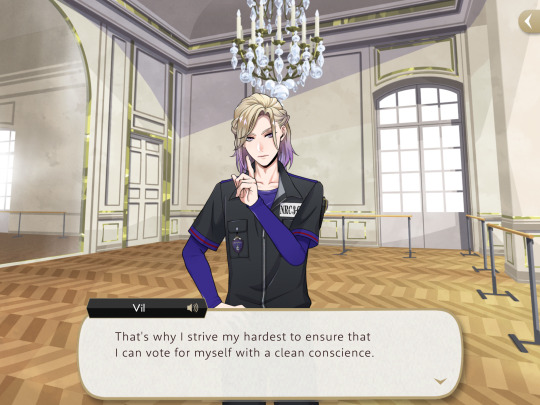
Vil was undoubtedly in a very emotionally vulnerable place right after his overblot. He went to great lengths to conceal the aftereffects before going on stage to the point he collapsed as soon as he was alone. After going so long trying to hide them, his darkest, ugliest emotions were laid bare to his teammates and to himself. Manifesting in the worst way possible. And as a professional performer, if any errors were made, he would have been painfully aware of them.
And yet, despite having just dealt with the darkest moment of his life, Vil was still able to stand upon the stage until the very end and give the best performance he could. Against all odds, before a world that has wrongfully perceived him as evil and hideous for most of his life.
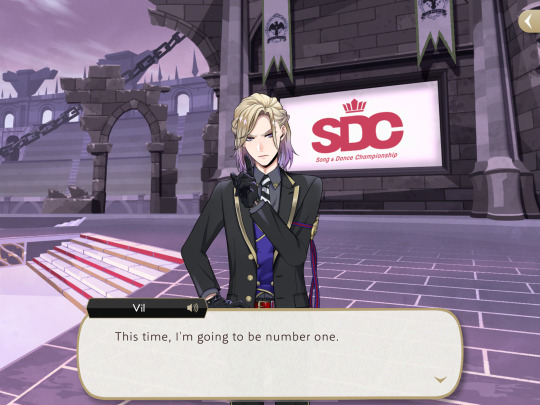
And despite knowing that Neige possesses all that he never can, it is strongly implied that Vil still chooses to vote for his own team. Meaning he saw the appeal in Neige’s performance and STILL knew that he did better. And I’d like to believe that even if Vil was aware of Neige’s backstory, he would have still made the same decision. It’s easy to be beautiful when everything is right and perfect in your world. But being able to smile even when you’re struggling and your heart is breaking is even more beautiful still.
Sadly, Vil isn’t likely to realize this anytime soon and will continue to see his own mental struggles as not as valid or “ugly.” Now back to that original pin of thought, Vil will likely continue to believe that he didn’t deserve to win the VDC despite all evidence to the contrary. He’s likely to continue internalizing the false villainous image of himself as well. And for that we now must get to the crux of this matter.
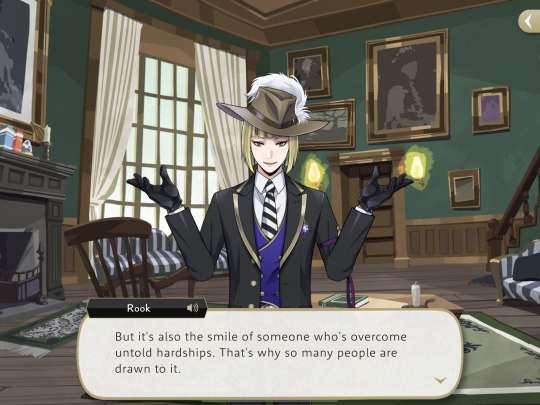
At first glance, this statement doesn’t seem like much but when you look deeper, and look back at some of Rook’s own actions, this comes off as incredibly hypocritical and cruel. As we have seen from Vil’s backstory, he has dealt with untold hardships as well. But Vil’s anguish is more internalized than Neige’s and it’s very unlikely that he has ever really been open about how dehumanizing and hurtful his treatment has been.
And from an outsider’s perspective, his problems aren’t as dire anyway. It’s just like Vil said, his life has been quite different from Neige’s. But mental trauma doesn’t know demographics and can affect anyone. The fact is what Vil has gone through is extremely traumatizing and comes from nothing beyond people wrongfully vilifying him for his beauty. Projecting their insecurities onto him from a very young age. It’s clear that what Vil has dealt with has fundamentally altered how he sees himself.
But at the same time, what do you think would happen if Vil WAS more open about his frustrations? The dehumanizing effect and the bullying? The typecasting and prejudice thrown his way? And the feeling that nothing he does will ever be enough to break free from his villainous mold? What would happen if Vil were to be open about ANY of that? He would be mocked and shamed and perceived as shallow, petty and crying about nothing. Lowkey how many in the fandom already see Vil anyway. We as a society sadly don’t take mental illness as seriously as we should but when celebrities deal with it? It quickly becomes meme fodder and nowhere is this more obvious than on stan twitter. We are all guilty of feeding into it, whether we’re honest about it or not.
Ironically, Vil’s mental struggles is one of the things that would make him more “relatable.” But the truth is that people would never accept that because society has a long history of trivializing the mental issues of celebrities because they seem so far removed from normal people. And then being surprised pikachu faced when they do something drastic to themselves. So Vil internalizes all of it because he knows he can’t be open about it.
A person like him simply can’t be open about his hardships but HERE is the kicker: neither can Neige. He also has an image of perfection to uphold so it is likely he is also internalizing mental struggles of his own. Living and caring for seven others can’t be easy in addition to trying to grow his career. And if his deeper origins are anything like his Disney counterpart, how he came to live with the dwarves must have been traumatic as well.
But here’s the difference: from Rook’s perspective, he is “better” at internalizing those ugly emotions than Vil is. After all, Neige is able to overcome all his struggles and still smile and not give hints to them, but when Vil finally buckled under all of his own trauma, we see what happened.
There’s also the fact that since Rook and Neige attend different schools, Rook doesn’t have as close a seat to any of Neige’s more personal troubles. So it’s likely easier for Rook to project his own ideas of beauty onto Neige because from his perspective, he is perfect. He is beautiful. He is pure. Like the legendary singing princess Rook so reveres. He isn’t plagued with any of the ugly emotions that caused Vil to overblot. And if Neige DOES have ugly feelings or ugly trauma responses, Rook isn’t privy to them, so they clearly must not exist.
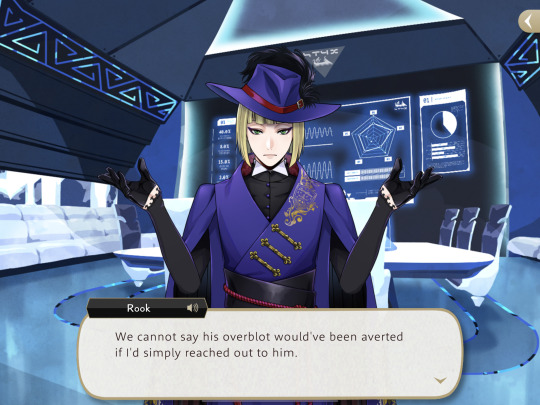
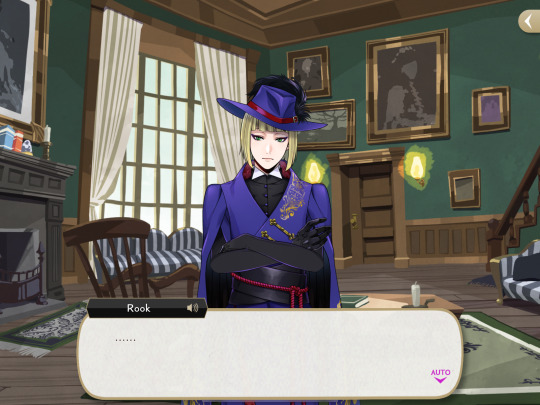
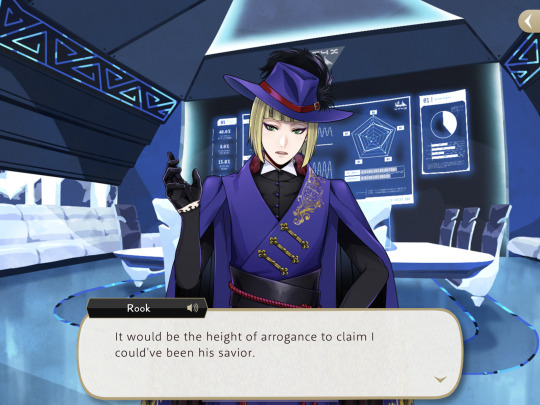
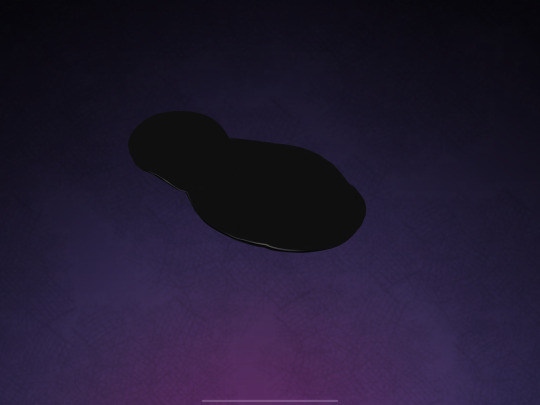
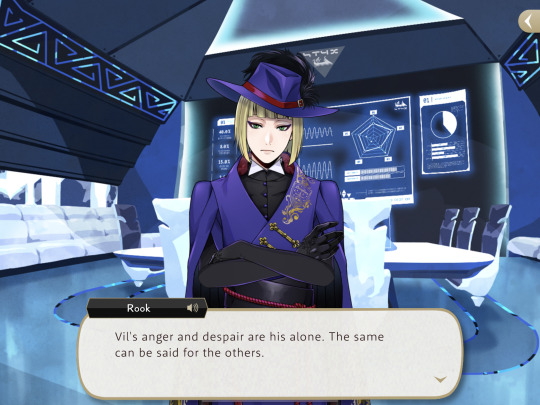
I genuinely believe that THIS is what Rook meant when he stated Vil’s performance wasn’t as beautiful as Neige’s. I know he mentions another reason at the end of book 5 but in my mind, they are both one and the same. Whatever technical difficulties NRC Tribe had, they were still polished enough to garner enough votes that it was only Rook’s flawed ideology that sealed their fate. And throughout book 5, Rook is hinted at being aware of Vil’s internal struggles and yet still chose to stay silent. He frequently saw that Vil was struggling but tried to justify his silence by saying it wasn’t his place to interfere.
But that is also untrue because we’ve seen time and again Rook is more than willing to stick his nose in Vil’s businesses. His labwear vignette is the most obvious example but there are plenty of others. In Book 6 Rook admits that his decision to go to the Isle of Woe was fully a selfish one. Leaving Pomefiore without leadership and potentially falling into chaos (the only dorm to have no clear leadership at all during the crisis) simply because he wanted to give Vil skin products that he really didn’t need. A few days without them wouldn’t do that much harm and Rook essentially placed Epel, Yuu and himself in great danger for a reason far more shallow than anything Vil has done in the name of beauty.
He also admits that he would have been willing to drink the poisoned juice Vil gave to Neige for again, a pretty shallow (and extremely twisted) reason. If he’s willing to do that, he is more than capable of intervening in other matters on Vil’s behalf. And later in book 6, it’s revealed that Rook was originally a Savannaclaw student but made the very unprecedented decision to transfer to Pomefiore in part due to his fascination with Vil and desire to further study beauty under him. So Rook had EVERY opportunity to step in regarding his overblot. Even if Rook couldn’t be his “savior”, the fact that Vil would see that he at least had support could have gone a long way.
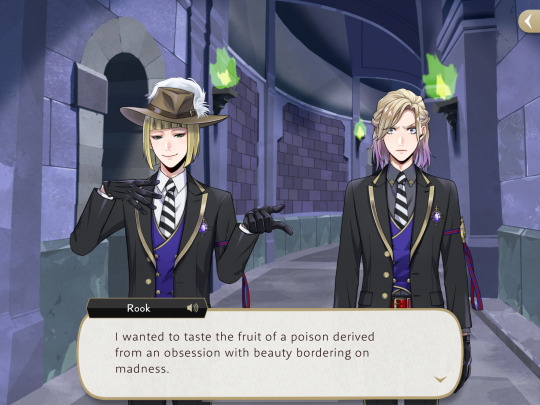
But Rook’s silence is rather in keeping with his character and his own ideas about beauty. I find this quote very ironic based on how he and Vil are frequently misconstrued. The Pomefiore dorm leaders' views on beauty appear to be the opposite of each other.
Vil can be extremely strict, harsh and can come off as critical at times, but he is never harder on someone than he is himself. He has shown time and again that he sees beautiful potential in anyone. And Vil is more than willing to share the spotlight with his NRC Tribe; build them up from scratch and give each of them the chance to show off their potential. Likely because he knows all too well what it means to be in the shadow of someone else.
Even further, when we look at the dichotomy of a villain versus a hero, the main difference is how they respond to their personal pain. A villain takes their pain and says “the world hurt me so I’m gonna hurt the world”. While a hero says “the world hurt me and I’m not going to let it hurt others”. Up until his overblot, Vil has been the latter of these examples. He wants the best for those around them and while his methods might be difficult to understand, they always bear results. Vil can honestly see beauty in anything, even if he has to coax it out in his own way.
Rook’s views on beauty however, all seem to be based upon the superficial and the evidence can be found in his Halloween vignette. There, he explains further how he grew to adore Neige and based on what he said, it sounded more like obsession than actual reverence. There’s also hints to this in his most recent birthday vignette as well. His ideas seem to be very fantastical, far removed from reality and so obsessive to the point that it actually affects his ability to be a good person. Such an obsession can sometimes make people oblivious to the world and in Rook’s case, often cause him to act out in ways that border on problematic.
In his fixation, he stalks Leona and Jade, says some weirdly otherist shit to Malleus, harasses and assaults Ruggie, and places ridiculously high standards on both Vil AND Neige that rob them of their humanity. Rook saw firsthand how deeply Vil’s insecurities ran. He heard Vil cry and scream out how ugly he felt. He saw Vil’s anguish and despair firsthand and seeing all that, still chose to punish him because Vil’s lack of confidence made him unable to respond to his trauma in a beautiful way. Or at least in a way he could deem as beautiful based on his vapid description of the word.
Rook will likely never be privy to any ugliness Neige has displayed so for him, the fantasy remains intact. And in chasing that fantasy, he betrays not just Vil, but his other teammates as well. Then has the audacity to try to justify it with bullshit ideology and sadly, because of Vil’s low opinion of himself, Rook succeeds. Vil holds Rook’s opinion so highly that he is able to take advantage of that and compel him (and the others) to see his point of view. And believe it or not, in chasing that fantasy, the NRC Tribe members were not the only ones Rook hurt.
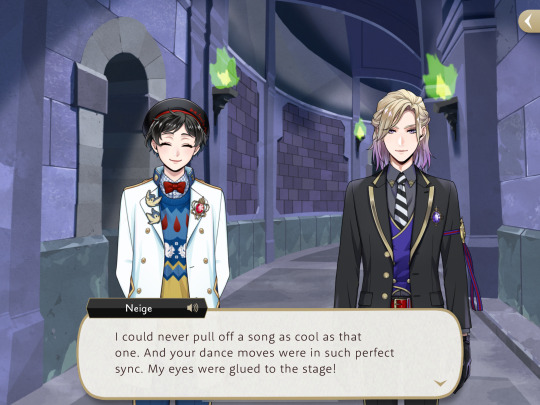
Neige might have been happy to have won but he was essentially rewarded for an inferior performance and robbed of an important lesson. One far more valuable than any “lesson” Vil had to learn. As mentioned before, even with all of his hardships, if what we saw in book 5 was the best Neige could do, that still means he is not as good a performer as Vil. If cuteness, nostalgia and warm fuzzy feels are the only thing Neige can offer, he could easily find himself struggling to remain in the entertainment industry as he ages. Not unlike many other former child stars in real life.
Losing the VDC could have been a major wake-up call to Neige that if he wants to continue acting, he has to do better. People might not take him seriously when he’s still doing the cutesy bullshit ten years from now. But because he won, this will likely never cross his mind. Neige will learn nothing.
Now before anyone begins writing up their comments about how Vil verbally stated that Rook was right, I’d like to bring up one final point: Vil agreeing with Rook was another trauma response. Internalizing Rook’s response because it is so in keeping with all he has been made to believe about himself, about Neige, and how it has all now been “confirmed” by his overblot. From his point of view, Rook has no reason to lie to him.
But just because Vil states that Rook was correct, does not mean that it’s true. Despite being one of the more positive characters in the game and being twisted from a “good” character, Rook is just as morally grey as everyone else in the twst cast and just as capable of dubiousness. And this would not be the first time something like this has occurred between Vil and Rook. Once again, I bring up Vil’s labwear vignette. Particularly this exchange here:
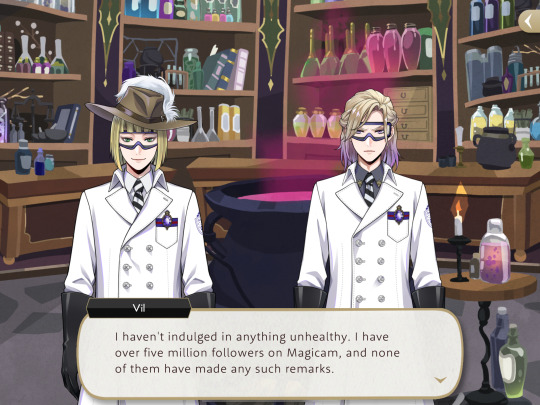
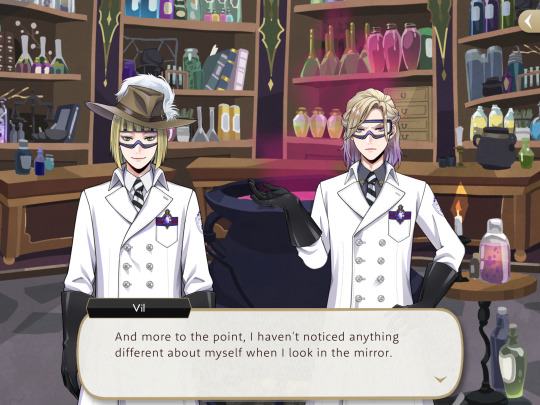
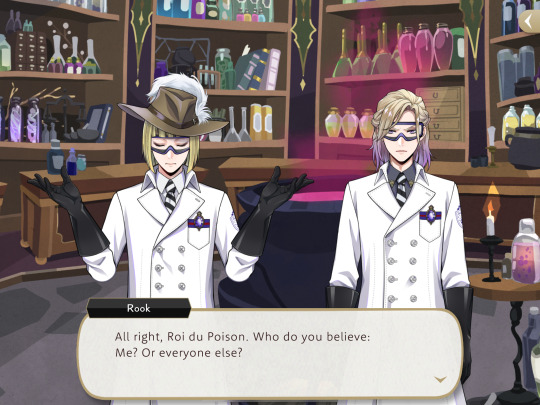
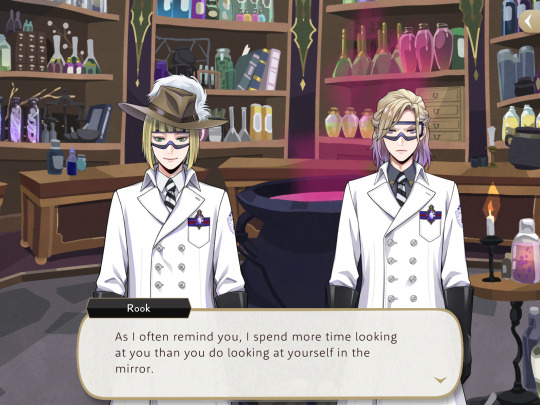
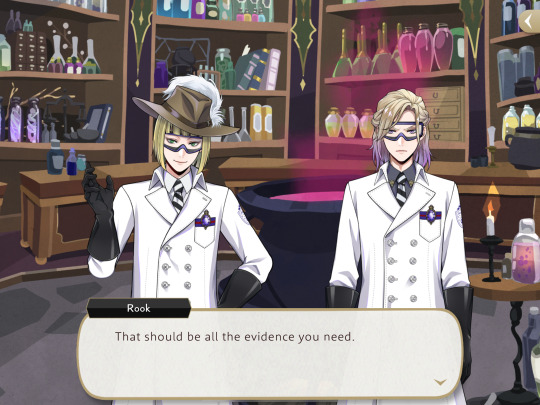
Okay, so beyond the general tactlessness of telling Vil he’s gaining weight in spite of knowing how such a statement would affect him, what Rook is basically suggesting to him is that he cannot trust anyone but him. Not even his own senses. That for all of his perceptiveness, Vil is incapable of seeing himself accurately. Though he initially does not believe it, Vil eventually does accept Rook’s statement despite knowing it was bullshit twenty seconds before.
Later on, Vil mentions to Trey that Rook’s only crime is being too blunt and perceptive. It’s true that having another point of view is important at times, but the level of trust Vil has in Rook’s opinion can also be dangerous if he can convince Vil to doubt himself so easily. Theirs is an interesting dynamic but it also has potential to be extremely toxic and detrimental to Vil. At best, Rook gives him useful insight and pushes him to be the best he can be. But at worst, Rook contributes to Vil’s insecurities, enables his more toxic tendencies and his fawning of Neige feeds into his obsession to be the fairest one of all in the worst way possible. Rook can’t be completely oblivious to this. It would be such an easy thing for him to take advantage of Vil’s doubt in himself and value/dependency on his opinion.
Which is exactly what Rook does. As much flack Vil gets in this fandom for being critical and harsh to others, he never criticizes someone harder than he will criticize himself. This is a person who has grown up in the spotlight and has had to maintain an image of perfection for most of his life. A person who gave up one of his favorite condiments because of the damage it caused to his skin. A person who has so deeply internalized the villainous image people have projected on him that he wears it almost as a badge of honor. And because he holds himself to such a high standard and already internalizes a lot of toxic beliefs about himself, it makes perfect sense that Vil would agree with Rook. In his current way of thinking, Vil has no reason to disagree with Rook because from his point of view, Rook has always been honest to him and his overblot already proved he was unworthy of victory anyway.
Of course Vil must be gaining weight. How could he possibly be objective regarding himself? How vain he must be. And how could Vil possibly be objective regarding his VDC performance and still vote for himself after such an ugly trauma response? He can’t trust his judgment, he can’t even trust his own senses. How arrogant and pathetic Vil must be if he can still vote for himself in good conscience after witnessing the pure wholesomeness of Neige Leblanche. Someone who would never overblot. Thankfully, he has Rook to humble that arrogance and tell him what he needs to know. Even if he’s tactless about it.
I mean, Vil literally ran looking for a scale immediately after Rook’s comments on his weight. He probably added an extra hour to his daily workout routine the morning after eating the cake Trey gave him. I don’t believe that Rook is completely oblivious of Vil’s darker feelings, just as Vil has stated, he keeps too close an eye on him not to be oblivious. And he was astute enough to keep his infatuation with Neige a secret from Vil for nearly two years. This had to have been intentional. It honestly makes me wonder what Rook thinks of Vil on a more personal level.
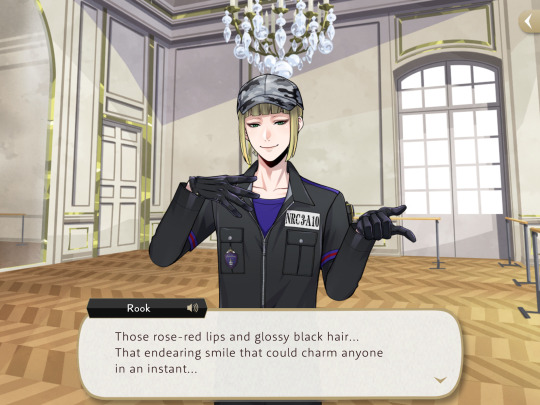
But regardless, the fact is, Rook was always going to vote for Neige and his explanation at the end of Book 5 was always going to be his reasoning. Vil’s overblot just gave him a more “legitimate” reason to do so. For whatever reverence he holds for Vil, it was never going to trump his reverence for Neige. The fact he brought all of his Neige photos with him to the training camp further implies that he was never going to be objective in this situation. And seeing Vil almost poison Neige probably further convinced him that Vil was undeserving of victory.
That may make Rook seem duplicitous considering how positive and sincere he seems to be, but he’s still human. And truthfully, him voting for his bias is not an inherently bad thing. What makes him inconsiderate in this situation is openly telling Vil he prefers the catalyst for all his insecurities and overblot, while Vil was still grieving and in a very vulnerable place. Then justifying his decision as the correct one based on his own personal preferences, weaponizing that vulnerability to avoid being called out. Knowing that Vil wasn’t likely going to object.
Even if NRC Tribe did win, it’s very likely Rook would have still brought up his vote to Vil and still convinced him it was undeserved. I would even go so far as to argue that Rook’s remarks about Neige early on in book 5 as well as Vil’s labwear vignette foreshadow the ending of book 5/start of book 6 far more than the fact that the huntsman betrayed the evil queen in the original Snow White.
That coupled with a perfectionist like Vil looking back at their less-than-perfect performance is what compelled him to agree with Rook. If we take into account the idea that Vil still chose to vote for his own team afterwards, Rook’s actions and words probably further pushed him into believing in the idea of his inherent villainy and inferiority to Neige. After all, surely Neige Leblanche would never be reduced to such a hideous state. His heart is too pure, the fairest one of all and as different from Vil as night and day.
If left to his own devices without Rook to influence him, Vil might not be so hard on himself in this case and would resent his defeat more. As he has every right to. But instead, Vil agreed with what was easiest and what made most sense based on everything that has happened in his life and all that he has been made to believe about himself. Why should he continue protesting when no one else will?
Nevermind all the evidence we’ve seen of Vil’s tenacity, excellence and kindness. Why should he believe that he is the most beautiful one of all when Mira frequently tells him the opposite? Why should he believe in his own noble spirit when people openly say it’s not enough and that he’s not relatable enough to be a hero? Why shouldn’t he believe he is hideous when the entire world says it’s so? When even a large majority of this very fucking fandom mischaracterize him as such and agree with Rook anyway?
Why should Vil question any of this?
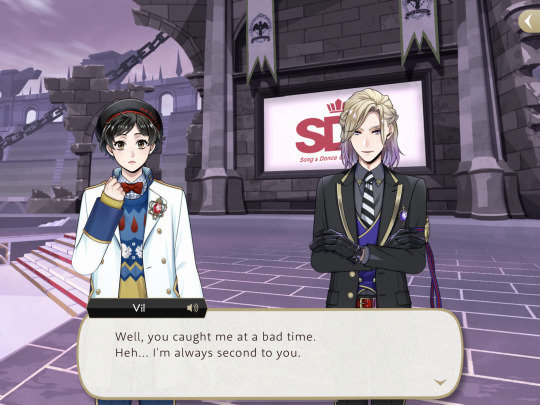
And Vil will sadly continue to be second to Neige and will likely never question it. He will continue to internalize the toxic dichotomy between him and Neige and again, why shouldn’t he? After all, Vil is the evil queen to Neige’s Snow White, the Sharpay to his Gabriella, the Odile to his Odette. And Neige is the Madonna to Vil’s whore. Vil is not supposed to be the hero in this story and not even his trusted vice dorm leader has faith in him.
In discourse regarding the end of book 5, I’ve often heard it said that this was a “lesson” Vil had to learn in order to become a better person. I believe there was indeed a lesson to be learned from this, but not the one that many think. Since Vil knew from the beginning that trying to poison Neige was wrong, he didn’t need to learn how to play fair like Leona.
Despite being a harsh leader, Vil was generally always fair with his teammates and again, as a former dancer, the way Vil instructed the NRC Tribe members seemed tame compared to some of the dance teachers I’ve had in the past. So learning to be less tyrannical wasn’t the lesson to learn either, like with Riddle. And part of what led to his overblot was realizing that NRC Tribe had been “outplayed” by Neige’s cuteness. But he still had enough faith in his ability to vote for his own team, so learning not to be manipulative wasn’t really needed either, like with Azul.
No, the lesson for Vil here is that hard work is rarely ever rewarded fairly. And that his trauma is not valid because he was blessed in a way that Neige was not. He must always take second place to him because of his blessings while simultaneously ALWAYS being perfect. And because of his blessings, he can never express ugly emotions, he can never express anguish, and he must always, ALWAYS, take his mistreatment in stride. And God forbid if Vil DOES respond to his trauma in an ugly manner, he WILL be punished for it. He will ALWAYS be punished for it and by those closest to him no less.
If Vil doesn’t like how they’ve treated him in his darkest hour, tough titties. It’s all his fault for not hiding his trauma to begin with. And he doesn’t even have the right to a moment to himself to cry.
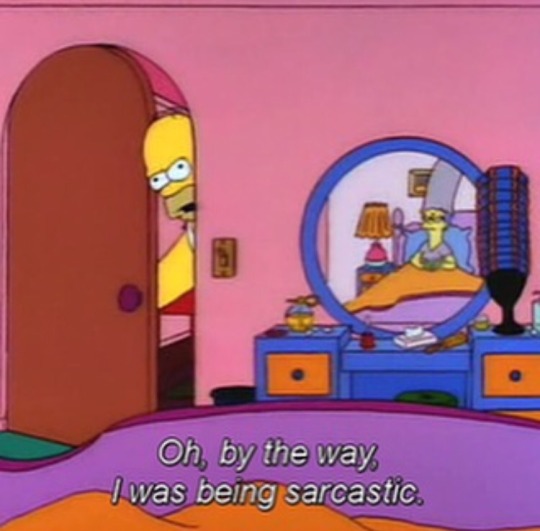
But that is where my analysis ends. Honestly this was kind of painful to write because it has made me fully realize just how much I’ve grown to disdain Rook after adoring him for so long. You all have no idea how hard I was hoping he would have some scrap of redemption in book 6. It’s really upsetting that so many people in this fandom look down on Vil or mischaracterize him but somehow don’t notice the glaring red flags in his dynamic with his vice dorm leader.
Honestly, when I think about it, the ending of Book 5 is actually kind of brilliant, even if it’s also emotionally sadistic and lacking in other aspects. I'm not sure if that was Yana’s intention, but the fact that so many in the fandom tend to see Rook as the kinder one compared to Vil is very telling.
Now I’m not saying that Vil is absolutely without flaws, Heaven knows he has many. As does every person in the twst cast. Vil is impulsive, domineering, harsh, difficult to please, overwhelming at times and extremely complex. But he is also helpful, perceptive, intelligent, genuinely kind and wants the best for those around him. Not for his own glory but for their own happiness and well-being. He is also clearly a deeply misunderstood and insecure young man, so I guess because of Vil’s faults, it’s ��easier” to mischaracterize him.
As for me, I find Vil’s character all the more compelling in spite of his harshness because I can see in him a true understanding of beauty that is both profound and attainable by anyone. If we are brave enough to behold it.
#twisted wonderland#jas reads twst#long post#twst book 5#twst book 6#twst vil#vil schoenheit#pomefiore#shut up jas
54 notes
·
View notes
Text
Hello and Welcome!
This is a blog dedicated to Journey to the West, where anyone interested may join in and follow along in a journey through Wu Cheng’en’s classic. This reading group will be focused on the Anthony C. Yu English translation, which the ever-interesting and enlightening @journeytothewestresearch has helped provide completely free to download and read as pdfs! The link can be found below:
https://journeytothewestresearch.com/2019/06/07/archive-10-journey-to-the-west-2012-revised-edition/
In full awareness that everyone has their own busy lives and differing schedules, this reading group is working off of a “do-as-you-want” model. Everyone is welcome to submit their analysis, art, reactions, memes, criticisms, additions of context, etc. as we make our way through the journey, but there is no pressure but to have fun with the work!
That said, there is a reading schedule. This reading group has now made it through Volumes 1, 2 and 3 of this classic, and will start up Volume 3 on April 13, 2025. The reading schedule encourages all interested to read one JTTW chapter per week. This group then "meets" every Sunday, which is be the day participants are encouraged to finish that week's chapter and/or submit their creative/analytical pieces about it. Sunday will also be the day where I will give a quick recap of that week's chapter, and will mass reblog anything participants submitted to have that work in the archive. Again, this blog has now made it through Volumes 1, 2 and 3 and will start keeping to the reading schedule for Volume 4 starting April 13, so please have read “Chapter 76: Mind-Spirit dwells at home, and demons revert to nature; Wood Mother together subdues the fiend's true self” by then. You’ll find the reading schedule for Volume 4 below, and while not necessary I do encourage everyone to give a look at Yu’s introduction to this text in Volume 1 as well.
I want to end by stressing that it is completely understandable that new members would be concerned about joining after the reading schedule has officially started, and indeed after we have made it through three volumes. As such, I want to confirm that while this group encourages people to send in their submissions on Sunday for the chapter covered that week, you should feel completely free to both submit your stuff on any day of the week that’s best for you, as well as to send in art, memes, analysis, commentary, etc. for every chapter that has already been covered according to the reading schedule. In other words, all I’m going to ask is that your “late” submissions are in line with what happens in Volumes 1 and 2 and/or chapters in Volume 3 that the group has already read as laid out in the reading schedule below. So for example you should feel free to submit the sketches you made about Chapters 71, 72, 73, 74, and 75 on the Monday-Saturday of the week following the Sunday this book club finished Chapter 75, but please save your meme about Chapter 76 for the Sunday that chapter was scheduled to be read. So start, read, and submit as you can!
Thank you and thank you again to anyone who wants to participate and to everyone who has already expressed so much enthusiasm and contributed so much to this reading group! I’m very happy and excited to continue this literary pilgrimage with you all.
---
Journey to the West Volume 4 Reading Schedule
April 13-Chapter 76: Mind-Spirit dwells at home, and demons revert to nature; Wood Mother together subdues the fiend's true self
April 20-Chapter 77: A horde of demons affront native Nature: The One Body bows to True Suchness
April 27-Chapter 78: At Bhiksu he pities the infants and summons the night gods; In the golden hall he knows the demon speaking on the way and virtue.
May 4-Chapter 79: Searching the cave for the fiend he meets Long Life; The proper lord of the court sees the babies
May 11-Chapter 80: The fair girl, nursing the yang, seeks a mate; Mind Monkey, guarding his master, knows a monster
May 18-Chapter 81: At Sea-Pacifying Monastery Mind Monkey knows the fiend; In the black pine forest three pupils search for their master
May 25-Chapter 82: The fair girl seeks the yang; Primal spirit guards the Way
June 1-Chapter 83: Mind Monkey knows the elixir source; Fair girl returns to her true nature
June 8-Chapter 84: "Priests are hard to destroy" completes great awakening; The Dharma-king attains the right, his body's naturalized
June 15-Chapter 85: Mind Monkey envies Wood Mother; The demon lord plots to devour Chan
June 22-Chapter 86: Wood Mother, lending power, conquers the fiendish creature; Metal Squire, using his magic, extirpates the deviates
June 29-Chapter 87: The Phoenix-Immortal Prefecture offends Heaven and suffers drought; The Great Sage Sun advocates virtue and provides rain
July 6-Chapter 88: Reaching Jade-Flower, Chan convenes an assembly; Mind Monkey, Wood, and Earth instruct disciples
July 13-Chapter 89: The yellow lion-spirit in vain gives the Muckrake Feast; Gold, Wood, and Earth disturb with a scheme Mount Leopard's-Head
July 20-Chapter 90: Masters and lions, teachers and pupils, all return to the One; Thieves and the Dao, snares and Buddhism, quiet Ninefold-Numina
July 27-Chapter 91: At Gold-Level Prefecture they watch lanterns on the fifteenth night; In Mysterious Flower Cave the Tang Monk makes a deposition
August 3-Chapter 92: Three priests fight fiercely at Green Dragon Mountain; Four Stars help to capture rhinoceros fiends
August 10-Chapter 93: At Jetava Park he asks the aged about the cause; At the Kingdom of India he sees the king and meets his mate
August 17-Chapter 94: Four priests are feted at the royal garden; One fiend vainly longs for sensual joys
August 24-Chapter 95: Falsely assuming true form, the jade hare's caught; True Yin returns to the right to join Numinous Source
August 31-Chapter 96: Squire Kou gladly receives a noble priest; The elder Tang does not covet riches
September 7-Chapter 97: Gold-dispensing external aid meets demonic harm; The sage reveals his soul to bring restoration
September 14-Chapter 98: Only when ape and horse are tamed will shells be cast; With merit and work perfected, they see the Real
September 21-Chapter 99: Nine times nine ends the court and Māra's all destroyed; The work of three times three done, the Dao reverts to its root
September 28-Chapter 100: They return to the Land of the East; Five sages become perfected
216 notes
·
View notes
Note
I'd like to know your opinion on why ts songs are considered so good lyrically by her fans. That one line in cardigan is hailed as the peak writing skill by them. The one that says you drew stars around my scars. Am I missing something or are they just gaslighting me?
Hello- sorry it took me sooooo long to get back to you :) I am a busy little bee these days- but I love chatting with people too! <3
So, the line “you drew stars around my scars / but now I’m bleeding” is perhaps good writing, when we only compare Taylor Swift to her own work. It’s certainly a change from “the players gonna play, play, play,” but it is not somehow a gift to lyricism. I know that swifties tend to use lines like these to say that “look see, she is a talented writer” when the truth is that it’s just a boring metaphor that essentially goes nowhere in the song.
Yeah- They are literally gaslighting you. It’s an alright line- but it’s not genius. The reason swifties think this line is amazing is because of the alliteration between "scars" and "stars." Apparently one alliteration is enough to make someone into literary genius? Just one repetitive sound- and they think she’s pulling off something amazing.
Compare this line to a full narrative arc in an alliterative verse epic poem from early Germanic Literature- and Swift's writing is basically loose change on the dashboard compared to gold bar- lyricism.
So, her line "you drew stars around my scars / but now I'm bleeding" is mostly incoherent. She's honestly saying word salad in most of her songs- with vague rhymes at the end of each phrase- but I digress.
I think you're keying into a thoughtful observation here. Putting aside my comment on its general incoherence, let me first speak to the fact that this line is an attempt at metaphor.
She is saying "you drew stars" in effort to merge the conceptual point of "drawing stars" to someone reaching out- or creating interpersonal connection. She continues "around my scars" to showcase how this new connection sees her past, the “scars,” and is encapsulating it with a drawn star instead of, for instance, marking it out with a black mark or something. The connotative value of the word star, in this case, calls forward the idea of goodness and since it is tied to her connotative value of "scars" as a past hurt- the line ultimately means that some new interpersonal connection is viewing her past and approving of it rather than hating it. It's meant to ring as a redemptive arc- yet nothing in the song actually needs redemption or ever mentions it again. The theme drops immediately after the line finishes.
The line finishes, "but now I'm bleeding" which is meant to mean that the scar is reopened- because the connection she made is no longer interested in her. This analysis, however, requires many leaps in logic. I cannot point to any specific linguistic markers that would denote the connection between "scar" and "bleeding." Though Swift clearly means to interconnect these two points, scars don’t bleed. So, she’s trying to say that the scar has reopened- perhaps because the person who drew the stars is leaving. However, there is nothing in the language itself that suggests this conclusion; rather she relies on audience reception to jump from point "a" to point "b." She never calls it a wound, she mentions "bloodstain" is a later line- but the connection between all the different phrasing is tenuous at best. I mean that there is no storyline within the line itself that is suggestive of the meaning Swift is attempting to lay out.
Beyond this line- nothing in the whole song ever revisits the thematic purpose of the metaphor. She never mentions stars, or scars, and does not revisit the theme of redemptive love. She barely even lays out the idea of redemption in love in the first place- and further drops the imagery by never going back to the same theme again. She conjures up this image just to drop it immediately.
This is a pattern in her work- she writes one thing, and then drops the idea.
I mean it sounds clever- without actually being clever.
#anti taylor swift#taylor swift criticism#literary criticism#taylor swift critical#ex swiftie#metaphor#cardigan
36 notes
·
View notes
Text
Yet Another Post on How to Write a Thesis Statement
I feel like no one tells you how to write a university-level thesis statement once you’re out of high school. They lowkey just throw you into your first university/college class without actually explaining what it is—or if they do, they beat around the bush and say something like, “Make a good argument people can disagree with.” It’s a foundational piece of advice, but it should be explained further.
So, here’s how I wrote my thesis statements in university. What I found helpful was the order in which to formulate one.
1. Establish a basic argument. But how do you know it can be argued against? Pretend you’re the reader and brainstorm some counterpoints (more on this later).
Example: “X character’s lack of empathy results in their abandonment.”
2. Think of your evidence. You know how, in elementary or high school, they’d make you pick three pieces of evidence? Same thing, perhaps worded more eloquently. Here, I’m asking myself how or when does X character exhibit a lack of empathy? What is my proof they do this?
Example: “By not aiding those in need when they have the means to, X character demonstrates how their lack of empathy results in their abandonment.”
3. Answer the very important “So what?” question. Why should anyone care about the argument you’re making? Why is it worth reading?
Example: “By refusing to aid those in need when they have the means to, X character demonstrates how their lack of empathy results in their abandonment, suggesting that their social isolation is ultimately self-inflicted.”
Can another scholar argue against this thesis statement? Sure. They might say X character’s flaws are not what brought upon their supposed ostracization: rather, maybe X character’s upbringing is to blame (say, they grew up with certain values emphasizing selfishness), or they were undermined by others, which led them to their situation.
Your thesis should be specific but also leave room for deeper discussion in the middle of your essay (note how I didn’t go too in-depth with my evidence; I would give more detailed examples of how X character didn’t help others of their own free will in my body paragraphs).
One last thing I’ll mention is this thesis I created is intended for a literary analysis paper (I chose to analyze a character, albeit one I made up). The wording for other types of approaches/essays will differ depending on the goal you have in mind, but it comes with a lot of practice and exposure to other fields of research. The more classes you take, the more material you can pull from them and incorporate into your essays. For instance, interpreting a conflict from a disability lens (that is, considering how an issue would affect people with disabilities), is one way to look at it.
Long story short, experiment! Brainstorm and rearrange sentence fragments until something sticks. I hope this made sense and can help at least one of you with your writing. All the best :)
#essay writing#essays#essay#literary analysis#university#college#study tips#writing tips#literature#books#reading#writing
19 notes
·
View notes
Note
So I’m not really big on poetry and classics, and I love this religion and really want to continue learning and practicing it. But its just so hard for me to read these kinds of things to learn about the myths and the hymns and Ive been struggling with this a lot . Do you have any advice or recommendations? Thank you sm 😭
hi!!! sorry it took me some time to get back you, ive been incredibly busy lately. thank you for your question!! i do have some advice for you that helps me:
-don’t be afraid to use wikipedia or other similar resources. what i do is i’ll open the wikipedia page for whatever piece im reading and read the summary of it first so i have a general idea of what’s happening, then ill read the actual source text. this helps me understand the actual plot better so when I read the source, i don’t have to work so hard to figure out what’s happening and i can focus more on the details.
-look up study guides! it’ll help you know what to look for as you read and help break things down in more digestible ways. -try different translations. i love theoi.com but the versions of the texts they have available can be challenging to understand. i've heard very good things of emily wilson's translations of the epics in terms of readability. i have a pdf of apostolos n. athanassakis' translations of the orphic hymns and find them very readable as well. i haven't read his translation of the homeric hymns but he does have one! -youtube videos. do not be afraid of a youtube video. i suggest staying away from ones that are made more for entertainment's sake (channels like overly sarcastic productions and jake doubleyoo for instance) and instead veering towards ones that are more video essays/lectures (such as TEDed, religion for breakfast, pagan creators like fel the blithe, etc). no shade to the former content creators i mentioned, they make great videos with fantastic animations/art (and i enjoy watching them for their artwork and entertaining narration) but they're not something i would look to as a source for religious knowledge. i'm sure there's lots of good podcasts out there too, although i'm not a podcast listener. same kind of thing applies; try to listen to ones that are more for informative purposes, literary analysis, classical studies, instead of ones that are meant more for entertainment value. bonus points if they list their sources somewhere. -the literary tradition is very important, but secondary sources will also help fill out your knowledge on how to actually practice. books like labrys' household worship guide, burkert's greek religion, larson's understanding greek religion, and the vast amount of resources on hellenion.org, will also help you develop your practice (although there's plenty more than just those! those are just a good starting point). the myths are one piece of a puzzle; it's also important to consider how ancient greeks would have interpreted these myths and the cult around them, and that's not always evident in the myths themselves. sometimes there's veiled symbolism that needs explained. sometimes there's cult practices behind specific aspects of a myth. practices vary from region and time period, and the myths can also reflect this. different areas will have different regional myths and practices around the theoi. so it's not just reading the myths, it's also understanding the context around them, and a lot of times you have to go outside the primary texts to do that. i hope some of this advice helps you! kudos to you for putting in the effort to research. thank you again for your question. i wish you the absolute best of luck and may the gods be with you on your journey <3
11 notes
·
View notes
Note
Helloooo I am here with Thoughts yippeee
I love the fact that Genesis is a country boy. He tries to escape it but no matter how much he says he dislikes Banora he always carries that dumbapple around with him and is still best friends with Angeal (and won’t leave him for Midgar no matter how much he obsesses over leaving <3) and hrgvdbdh I love that so muchhhhh
Oooo yess I love them going to the caves looking for materia! Pfhdhfj I love that they know how to lockpick. Little shits terrors of the town god I love them. And god I love a good cave I can only imagine the fun they would’ve had exploring those. I would live in Banora so fast you’d have to drag me out of there
Hahhdhfhgb I am dying imagining the reaction of Shinra materia scientists when this 14 year old casually shows up with oodles of mastered materia when they can barely master any lmaooooo bet Genesis enjoyed that flex
Oughhh and the contrast of Angeal clearly still loving Banora unlike Genesis but not wanting to leave him more!!!! Gahhhh I hehrhthfhfh you highlight that so well and I’m going to chew through the drywall they love each other your honor
Anyways I LOVED IT THANK YOUUUU
country boy genesis is my truth! like yeah he flourishes in the chaos of midgar and that'll show in my other writing once i actually post more of the bpd!genesis project i'm working on (a near and dear project to my heart after my own recent diagnosis). he loves the chaos of midgar. but at his heart he also years for the countryside, for the orchards, for the materia caves that rest beneath banora. it's where he grew up and while his primary attachment to the area is angeal (and while he can't wait to get away from his parents) he can't help but love the place. it's not just banora, it's any countryside place. this guy loves kalm and the grasslands outside of it too. you won't miss my boy frolicking in the fields, that's for sure
of course they know how to lockpick there's like nothing to do there. if genesis wants in he will get in is all i'm telling you. he's like a cat. he will find a way into that cupboard. oh i love the materia caves underneath banora. the first time i played through crisis core i spent literal hours there just enjoying the music and the ambience. somebody needs to make a materia cave ambience on youtube i'd be on that so fast
i love my smart boy genesis. he can do everything. he's multilingual, he's a scientific genius, he can master materia better than any lab tech and he's intelligent when it comes to literature and literary analysis. i like him a normal amount. i need to think about him more.
not that angeal's any better. look at how whipped this guy is. "i'd follow him to the ends of the world if i needed to" dude are you alright honestly
thank you for your thoughts! i really liked hearing about them!
#asks and answers#star !!#thank you again please feel free to pop into my inbox anytime and i'll drop you some writing! either fresh written-#-or canned (from the document)#ficlets preserved like banora whites.........#okay to reblog
5 notes
·
View notes
Note
Hello Mr.Haitch!
I’m in a little hurry right now and so very sorry to jump this on you, feel free to ignore this if you’re busy right now, I’ll truly understand if you do!
So to give a gist- I’ve got my exam tomorrow, and the prof has given us *nothing* so far. And the way she has so far progressed in the lectures, honestly I’m looking at all my notes I made myself and I’m drawing up blank. I’m worried, because these concepts are flying over my head.
I was wondering if you could give me any source that I could read from or anything really that could help me understand these concepts today or like get a simple idea so I can atleast wing the rest in the paper tomorrow ;-;
These are the topics-
Structuralism, Post-structuralism, New Formalism—Tzvetan Todorov
Structural Analysis of Narrative—Vladimir Propp
Morphology of the Folk-Tale—Jacques Derrida
That Dangerous Supplement Of Grammatology— Jacques Derrida.
Roland Barthes—The Death of the Author
Marjorie Levinson—What is New Formalism?
Thank you so much in advance. And again you don’t have to answer if it’s too much!
Oof that's some heavy reading - Derrida in particular can be a challenge.
Some online resources can be useful, particularly for summaries and overviews. Here's a few that I've found:
Those should give you some kind of foothold, to start with. Your best bet for developing that is looking for any kind of commentary on those texts in your university library. Anything that offers an overview of postmodern literary theory.
I'm sorry I can't offer anything more substantial, this kind of nuts and bolts stuff was never really my forté. I know enough for light discussion and to find my way around for a research project, but beyond that I'm quite hopeless.
9 notes
·
View notes
Note
hey, i don't want to put you out or anything, i was just wondering if like off the top of your head if you knew any disability studies articles/books/whatever that center (or even just feature) tic/involuntary movement disorders?
so the answer to this was pretty much no but i spent a bit of time poking around and turned up this 2023 undergraduate honors thesis (link) by a student with tourette’s which seems like a solid starting point for going down the citation rabbit hole!
that piece is “The Embodied Performance of Tics and Tourette Syndrome in the Academic Environment” by Benjamin Allen; i’m only ~1/4th through rn but they argue for a continuum of ticcing + criticize the diagnostic system so i’m comfortable reccing it on that front! the (non-medical) tic-related works cited there are:
Buckser, Andrew. “Before Your Very Eyes: Illness, Agency, and the Management of Tourette Syndrome.” Medical Anthropology Quarterly, vol. 22, no. 2, 2008, pp. 167-192.
Buckser, Andrew. “The Empty Gesture: Tourette Syndrome and the Semantic Dimension of Illness.” Ethnology, vol. 45, no. 4, 2006, pp. 255- 24. https://www.jstor.org/stable/20456601.
Curtis-Wendlandt, Lisa. “Time and the Tic Disorder Triad.” Philosophy, Psychiatry, & Psychology, vol 27, no. 2, 2020, pp. 183-199.
Curtis-Wendlandt, Lisa, and Jack Reynolds. “Why Tourette syndrome research needs philosophical phenomenology.” Phenomenology and the Cognitive Sciences, vol. 20, no. 4, 2021, pp. 573-600.
Miller, James. “The Voice in Tourette Syndrome.” New Literary History, vol. 32 no. 3, 2001, pp. 519-536. Project MUSE, doi:10.1353/nlh.2001.0039.
Trubody, Ben. “Ticced off: An Interpretative Phenomenological Analysis of The Experience of Tourette’s Syndrome.” Journal of the Society for Existential Analysis, vol. 25, no. 2, 2014.
i also searched a handful of disability studies journals for a variety of keywords (movement disorder, tic, tourette’s, involuntary movement, chorea, huntington’s) but didn’t turn up much unfortunately, so all but the first of this next list include someone with tics and/or involuntary movements rather than being about moving involuntarily.
haven’t read these so i can’t speak to the politics / quality (although i’ll make a post if i’m able to read more) but here’s what seemed potentially relevant! also if anything is paywalled please don’t give T&F your money lol, try SciHub or if you can’t find something i can ask around for somebody with institutional access!
Cultural Differences in Reactions to Tics and Tic Severity (2021)
Using virtual reality to implement disability studies’ advocacy principles: uncovering the perspectives of people with disability (2023)
I had every right to be there: discriminatory acts towards young people with disabilities on public transport (2020)
From comedy targets to comedy-makers: disability and comedy in live performance (2015)
From the Case Files: Reconstructing a history of involuntary sterilisation (2010)
i also want to mention “Movements of the Uncontrollable Body Part Two” by Bronwyn Valentine (2019), a creative writing piece about her experiences of embodiment + ableism with spina bifida that i first read pretty soon after it was published & went looking for after developing my movement disorder a year ago because it was so impactful. @fndportal also has some incredibly vital work.
also if you haven’t already read Rosemarie Garland-Thomson’s Staring: Why We Look, it’s not specifically about involuntary movements but definitely a core text for theorizing any visibilized disability.
i hope some of that is helpful!! if anybody checks any of these out i’d love to hear your thoughts/critiques! all the best to you & i hope these offer some resonance with + understanding of your experiences 💓💓
#tics#ticcing#involuntary movements#movement disorder#disability studies#asks#reading lists#movements of the uncontrollable body
38 notes
·
View notes
Note
You know I gotta say if there’s one thing I enjoy about your blog. It’s that whenever you start diavoloposting into analysis about the character and story it actually manage to hit the brakes and make me think: Did I miss something. Has my understanding and opinion on Diavolo and his role in the story been off the mark. Am I in an echochamber of my own mind that has caused me to ignore what aspects of the character answer or justify my criticisms. Should I reconsider my views.
And then I read Part 5 again and it’s like nah. Diavolo still sucks. He’s still a chalk outline of a character. His motivations and how they intersect with his actions are still nonsensical. His DiD is a superpower instead of mental illness and actually makes the supernatural stuff plausible. His relationship to Giorno is still completely lacking. What little he has for other characters like Trish or Bruno or Polnareff or Risotto still falls apart. His threat as a villain is still ripped to shreds across the story. His defeat is still flaming garbage. His twinksona is still the only part of him that actually feels like there’s anything of an actual character going on and Doppio is still dragged down with him. And all of this might sound like I’m shitting on you but I’m really trying to offer praise. Because I’ve never had anyone actually make me double think on if I failed to get something in a story before. Your blog has actually made me feel like I’m a better literary analyst for taking the time to look things over again. So hats off to you for that.
LOL, I hear you. And thank you, I've never heard anyone tell me that before (I mean this in a genuinely appreciative way).
Diavolo is what I would describe as a character with a lot of "noise". There are a lot of lines and traits and connections that suggest some thread of meaning or depth (whether or not it's there by authorial intent is anyone's best guess, but it's there regardless), but nothing is done with any of it in a way that's cohesive or satisfying. That's why people often either come out with wildly different interpretations of what his character is and is trying to do or they just see him at face-value as boring because none of that potential is realized.
I understand when I try to give his character concrete meaning or depth in any interesting way, it is me trying to extrapolate that "noise". If it's actually there on purpose, it's not executed well, and if it's not on purpose, it's a vision of how the jumbles of Diavolo's characterization could've been put together into something coherent. It's basically just me imagining a better version of Diavolo based on the scraps that are present. (My goal is to get people to see that picture of "the cool Diavolo in my mind" if that makes sense.)
This is a big part of why Diavolo is such an infinitely interesting character to me. He is logically completely flat, but you can arrange him in so many different ways and analyze him and his flaws for what feels like forever.
7 notes
·
View notes
Text
I uncovered a church scandal?
so my current church has been using Interim Pastors for like two ish years now, and this morning it was delivered by C, who is less a substitute and more sub par, to the extent I vividly remember when she came last year because I was so irritated I rewrote her sermon. I personally don’t think I have to agree with *everything* a pastor says, since I see sermons as a way to examine philosophies and practice critical thinking/literary analysis. So, aside from the obnoxious Christian persecution complex (in the middle of the United ‘one nation under God’ States), my ACTUALLY main gripe with C was her poor writing skills. See, a sermon is essentially a type of persuasive essay, and C was not getting a passing grade. The beginning of the sermon today was a slew of trite, pithy phrases strung together with minimal/no analysis or elaboration, suggesting she was relying on external sources to derive meaning in her sermon. This flaunts basic principles of quote-analysis-conclusion formatting. But at least she moved past that part into an actually logical flow of constructed argument! I quibbled with the theology, but it was more than a semi coherent collection of hallmark cards.
However, that was my gripe with her. Was.
As I was explaining to my qpr what the conservative Christian dogwhistle ‘alienation of family-orientated people’ implied about C’s political leanings (credit where it’s due: she wasn’t obviously political), I had been looking up one of C’s longer anecdotes abt a celebrity. I hadn’t quite understood the story and felt I could improve my understanding w research. Might’ve zoned out and missed something that made me agree with her y’know? Benefit of the doubt. Except. Except.
Y’all I found the article she’d plagiarized her sermon from.
And I have a sharp memory so I was just staring at it in disbelief cause it was word for word a segment I’d literally just talked about. The dogwhistle I’d pulled out? About alienating family-orientated people? Literally not even her own words. I’d been right: C was relying on external sources to derive meaning in her sermon. Completely and utterly.
And my qpr goes: ….wasn’t it a hybrid service? (Introduced for quarantining; practice maintained for people who can’t leave their house/out of town/etc). So we pull up the livestream of the service, and at the 40 minute mark find that word for word she’s reading off an entire article from Christian today dot com. (Admittedly, an entire article *as far as we can tell* because of the paywall, but at least several paragraphs.) Literally caught her in 4k plagiarizing.
And the thing is. I personally know the man who controls which pastors are hired/fired in my state. As in, I literally had Christmas Dinner with him levels of ‘personally know’. Very real possibility I could get her fired.
At which point I stepped back from the vindictive adrenaline rush to be like. Hmmm so I could go through the entire sermon figuring out everything that’s been plagiarized, cork board with strings style. But that seems very obsessive, and while viciously roasting this woman is all fun and games, what’s exhilarating and validating isn’t necessarily what’s right. Is C intellectually bankrupt and not the best moral guide for a church? Perhaps. But like I don’t want to destroy a retired woman’s only income y’know? Especially if a gentle conversation could redirect her actions compared to blowing it up into something nasty. Me not wanting to hear her sermons is not the same as deciding no one should. I may not agree with her on everything, but it was still mostly harmless compared to a fire-and-brimstone beat sermon. Perhaps the original portions of her sermon really help someone else even if theyre not tailored to my religious needs. So I’d have no problems with her in general as long as it’s in her own words. It’s C’s choice on if she’s going to redeem herself, and far be it from be to deny her the grace of reform.
Luckily, I’m not in charge of handling the situation, and there are proper mechanisms in the church for handling accusations. Regardless, I’m just astounded I uncovered it and was in a position to break the scandal to the exact person meant to handle it.
#cw christianity#I’d noticed she was reading in the service but like. I’d do the same? Wrote my material in advance so I don’t have to stress about brain#Going blank at the pulpit#But no#Just. Reading an article word for word#It’s wild out here y’all#something to nom on
4 notes
·
View notes
Note
Hi! So I’m very excited about something. My post-colonial lit teacher has agreed to let me write my final paper on IBO as a post-colonial bildungsroman story, provided I can find enough resources and contextualize it properly. I’ve already found some papers that I think will be useful, and I’m reasonably confident I can do it. That being said, if you’ve run across any writing in that vein that might work for a paper like this, I’d welcome the suggestions!
Oooo, what a fantastic way of approaching it!
Sadly, I've little to offer in the way of relevant references. I have enough academic training to muddle through the kind of fandom-orientated analysis I do, but I haven't found a good angle to get into the wider literary or social context. This is partly owing to the way my brain works and partly because I just don't have the right kind of grounding to know where to start (I studied history of science, a loooong time ago now).
I keep hoping to at least stumble on decently rigorous essays on Gundam as a whole. So far, no joy in that regard. I know Yoshiyuki Tomino, the original Gundam creator, has had a lot written about him, including biographies, but I'm not sure how relevant that'd be to looking at IBO in particular.
In any case, best of luck pulling this together. It really does sound like a great angle to take.
5 notes
·
View notes
Note
Can I ask why you're still reblogging Marvel stuff over here when you've been very vocal about the boycott on tiktok? I'm not judging, just confused
As I said in the most recent video about what the BDS is actually asking us to do, when it comes to pressure boycotts it’s about showing the company that people who oppose this genocide still want this product so they have an incentive to actually change business practices. On tiktok I have almost 20k followers on here I have about 100. I’m nothing but an advertisement on tiktok because of my platform and the nature of the app. I have no platform here but also the culture of tumblr doesn’t make me reblogging a comic cover an endorsement of the product. Also like the divide between fandom bullshit and politic posts on tumblr is nothing. A lot of us have a set it and forget mindset when it comes to boycotts but like this is a pressure boycott we need to talk about it. I’m not buying comics anymore but I’m still writing letters to marvel comics asking them about their stance in this genocide. Obviously they’re not answering them, but it feels like doing something. I think the best thing to do in this time is to pirate marvel content, comics movies tv shows etc. well really the best thing to do is switch to indie comics but I don’t have any money to buy them lmao. I do believe that marvel comics has been used to tell important political stories in the past, Jack Kirby did not kill nazis for us to write his work and legacy off as pure bigotry, and I believe they can be radical again. We’ve got to talk about the way the mcu has twister and contorted the comic characters to fit into their war propaganda. I don’t think literary analysis and critical thought are limited to writing argumentative essays, I think fandom can be a way to analyze media. It rarely does but it can.
I’ve chosen to not talk about marvel at all until Sabra is removed from Captain America 4 but I know others are talking about back issues and things out of print and actively encouraging pirating, showing that there are ways to engage with these politics presented by the comics without giving marvel your money. A lot of people are replacing Starbucks and McDonalds with other brands or at home recipes and that’s what I consider fanfic and pirating right now. Look at Star Trek, fans can save an entire franchise. Look at the sequel rewrites in Star Wars after bigoted fan backlash, we can also change franchises too. If we work collectively and scream loud enough, maybe we can change marvel for the better. I don’t think the solution in this time is to stop being a fan because Disney and Marvel will always exist, this is why the BDS has called for a pressure boycott on Disney not a no buy boycott, but it’s time to use the collective fan community to demand change.
#asks#to be clear I’m still praying on the death of the mcu#but not marvel comics I know they’re better than this#sometimes with the right writer that is
11 notes
·
View notes